At the geographic center of Asia, there are mosques and mutton and poplar trees and camels and sand.
The temperature never rose above freezing and once we left Beijing even Joy's basic knowledge of the Chinese language wasn't enough to talk to people. But, the food was good and the ice sculptures were pretty and after a week and a half we escaped to Beijing before a mammoth snowstorm shut down Central Asia.
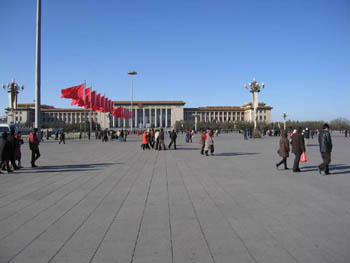
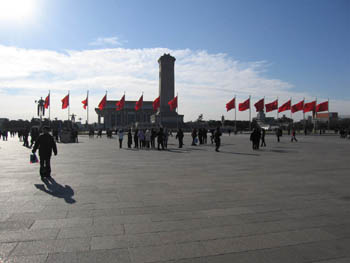
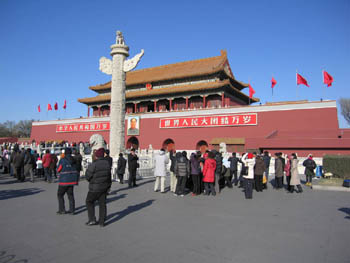
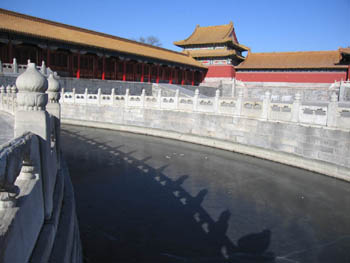
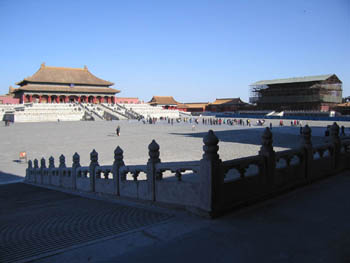
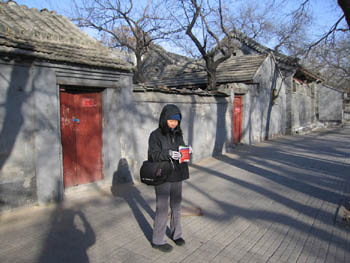
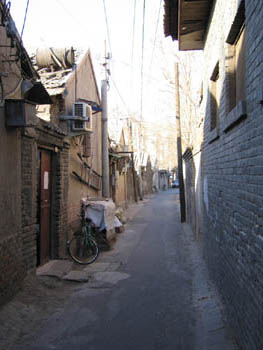
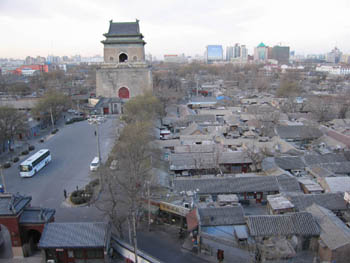
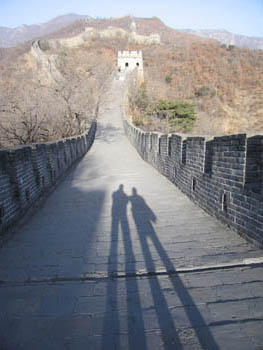
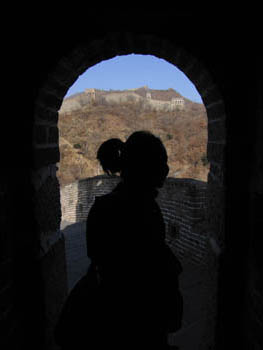
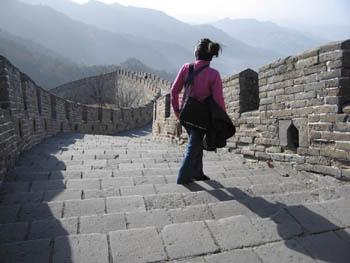
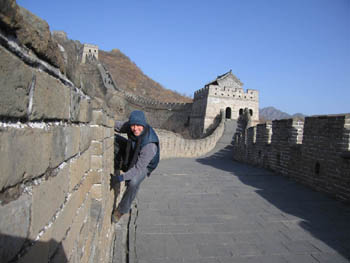
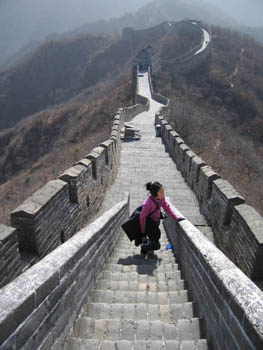
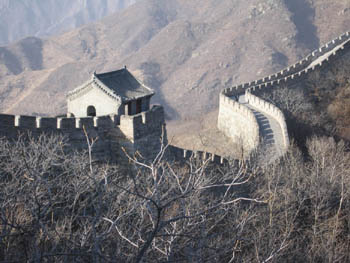
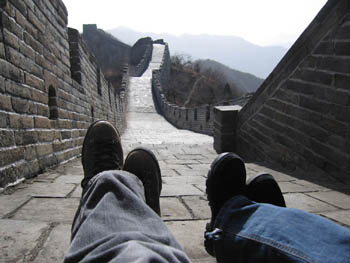
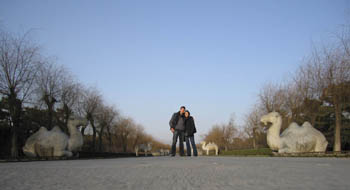
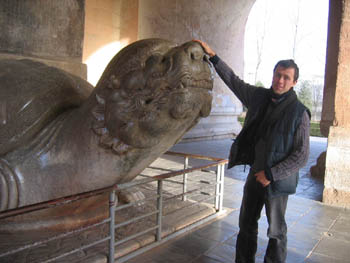
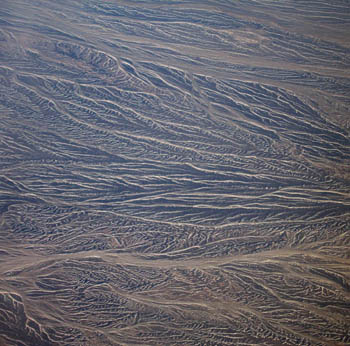
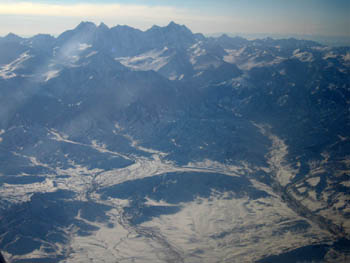
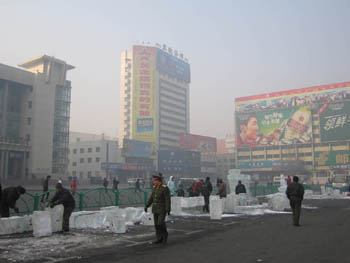
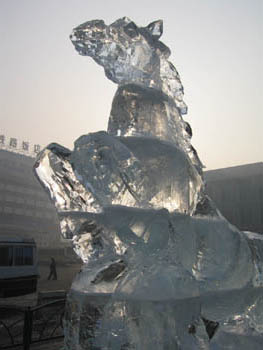
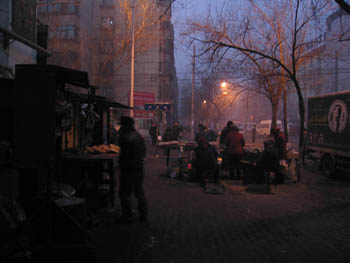
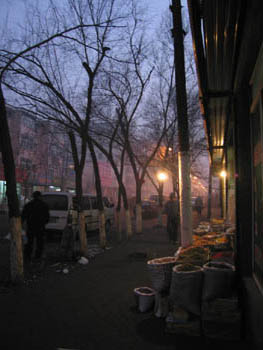
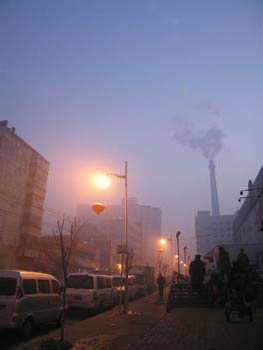
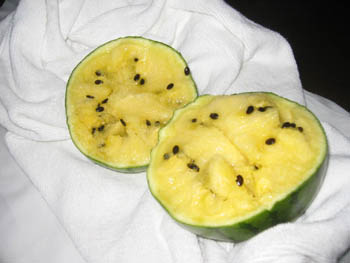
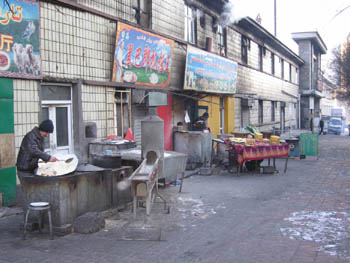
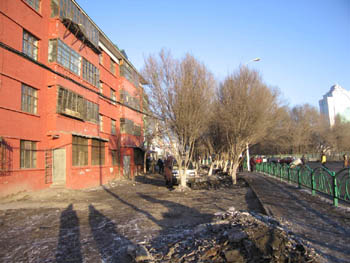
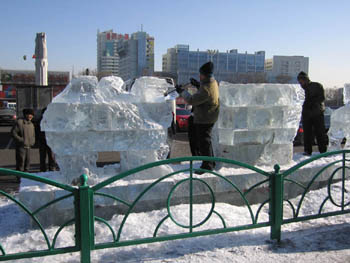

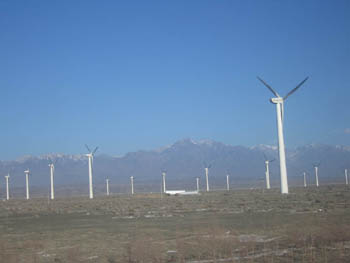
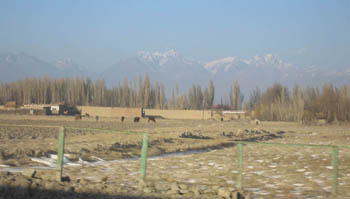
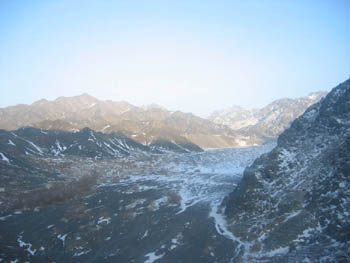
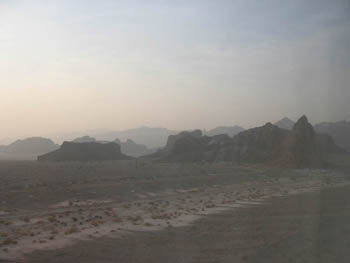
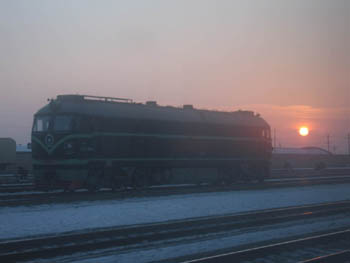
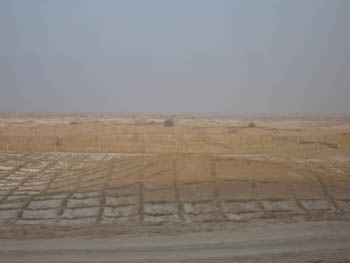
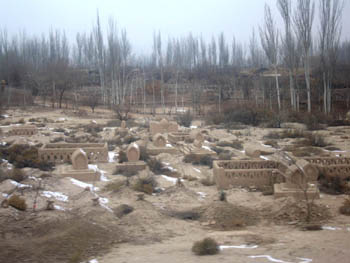
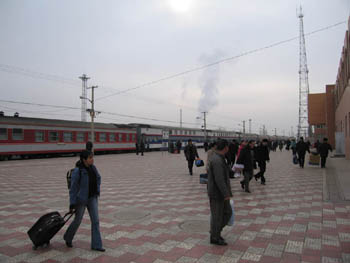
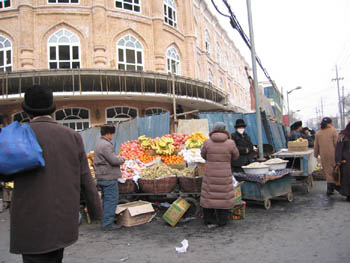
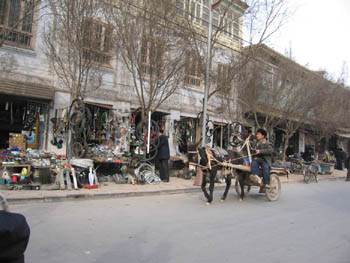
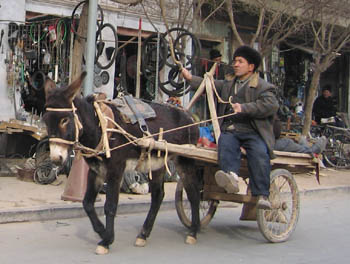
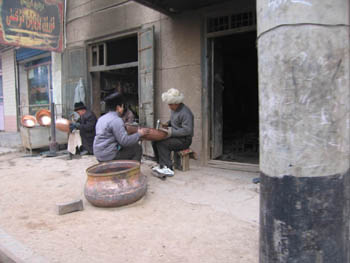
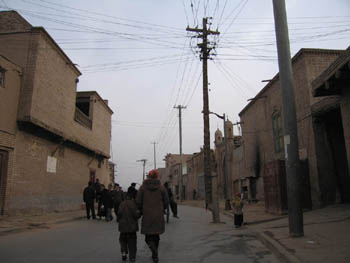
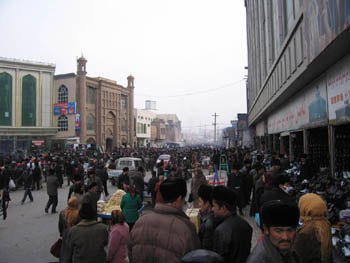
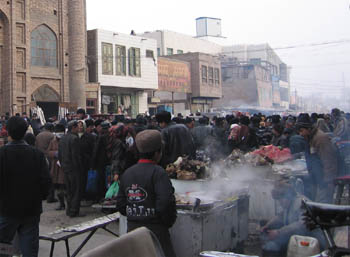
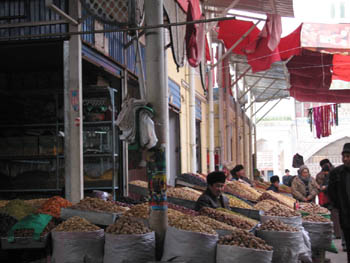
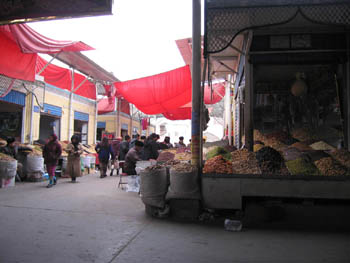
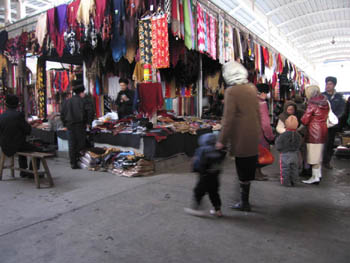
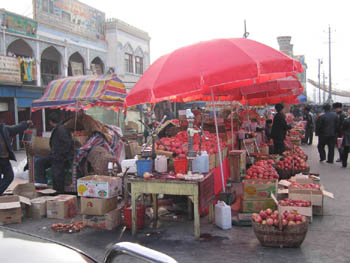
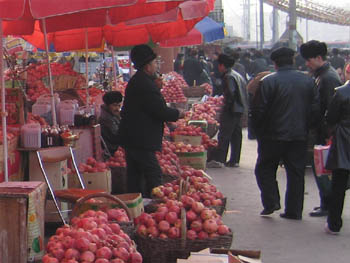
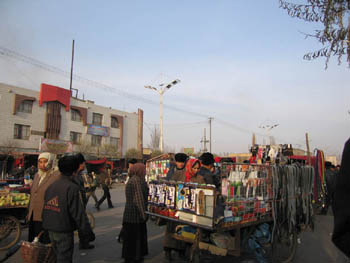
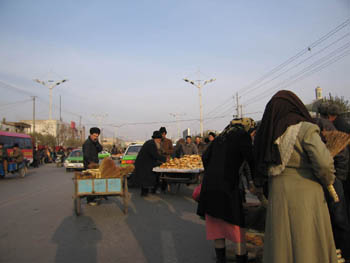
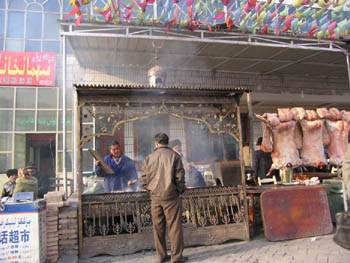
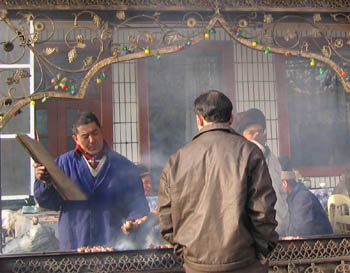
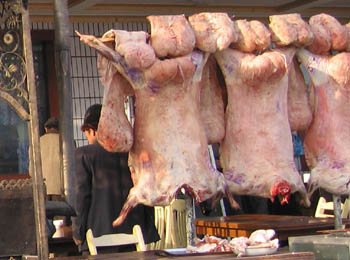
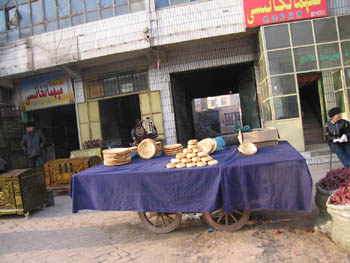
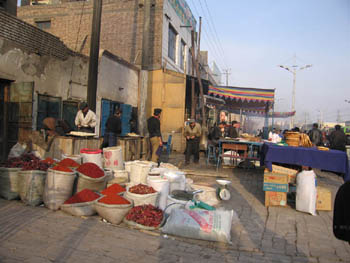
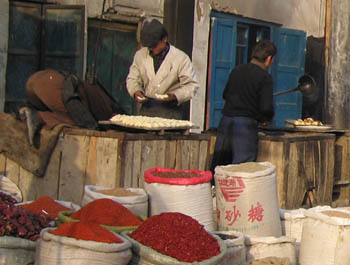
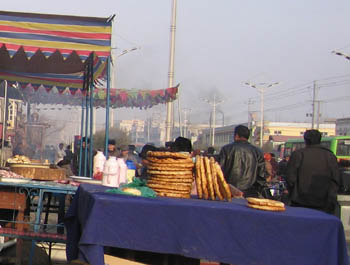
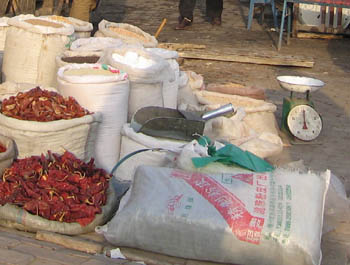
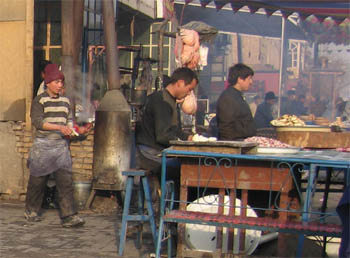
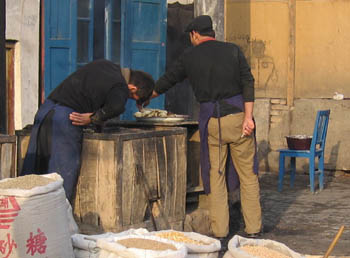
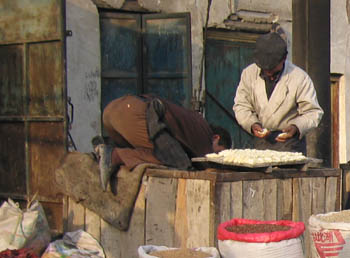
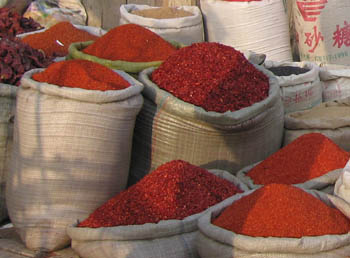
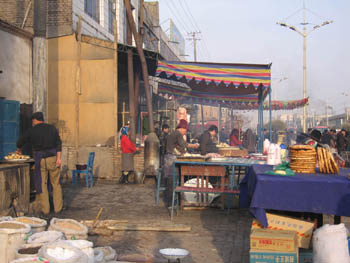
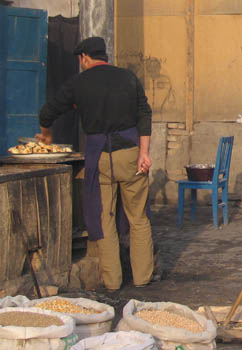
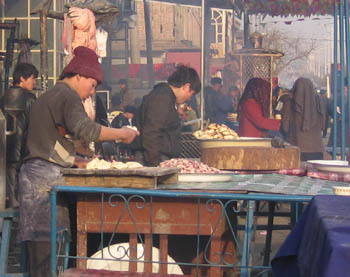
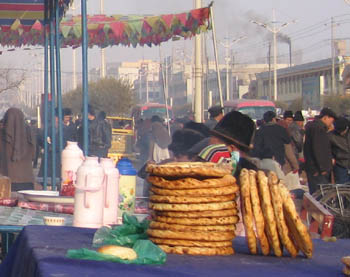
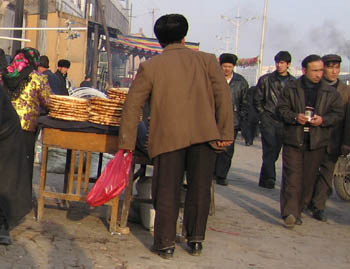
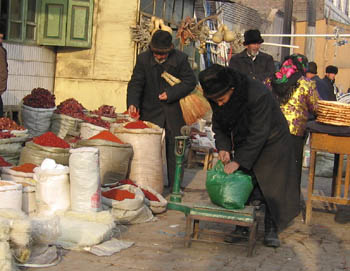
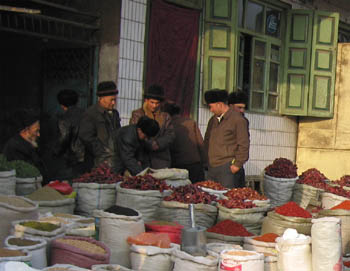
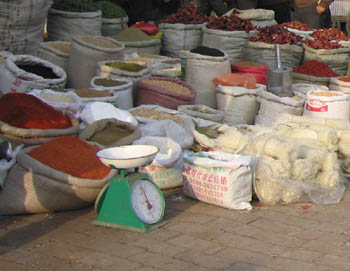
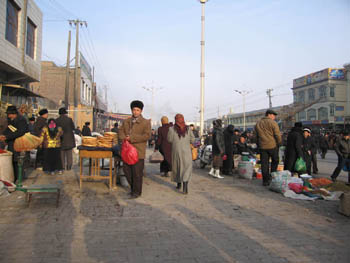
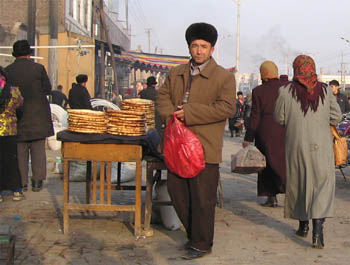
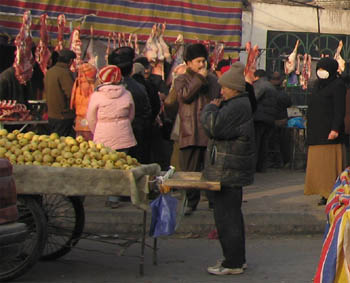
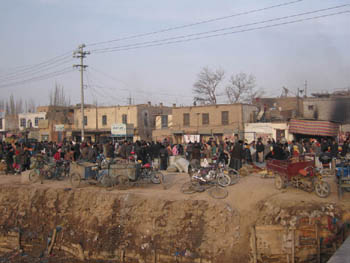
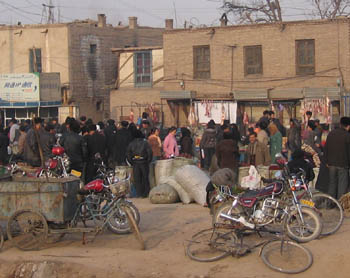
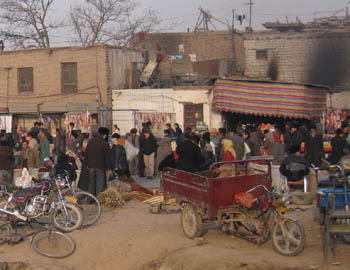
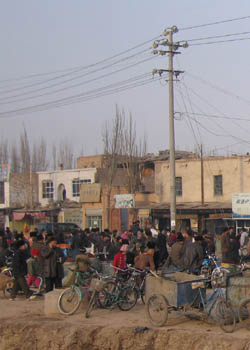
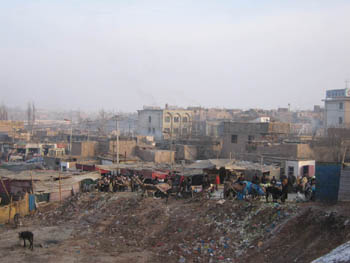
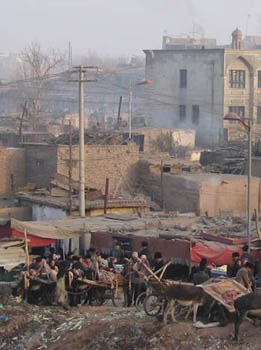
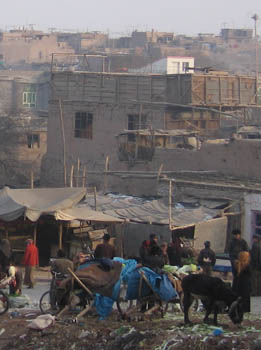
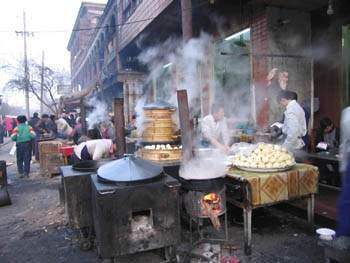
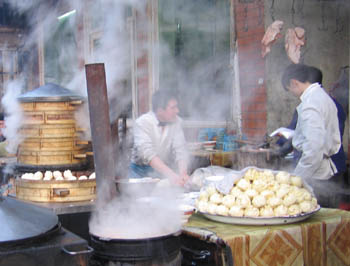
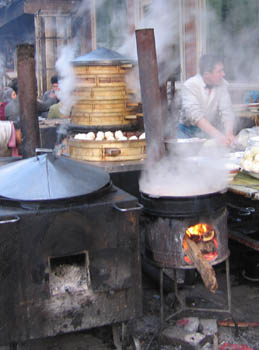
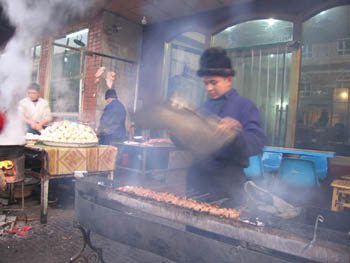
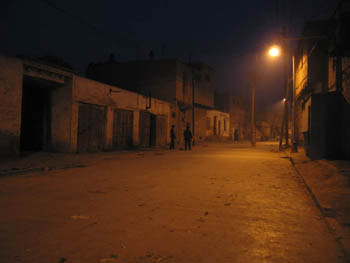
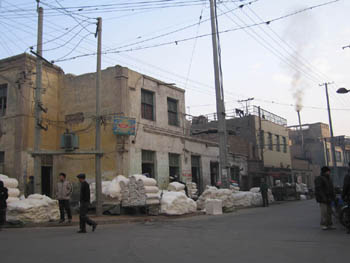
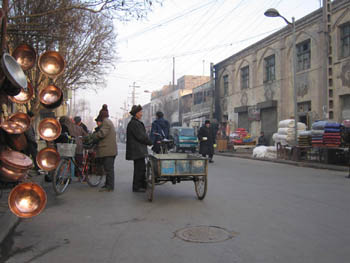
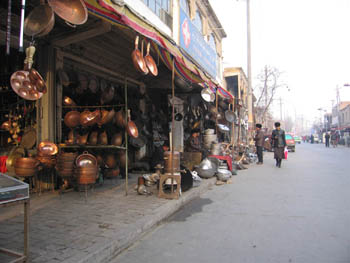
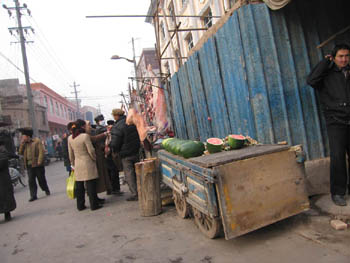
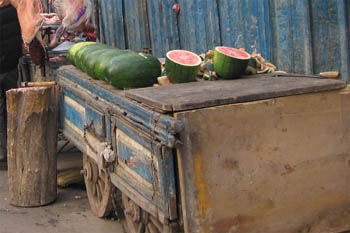
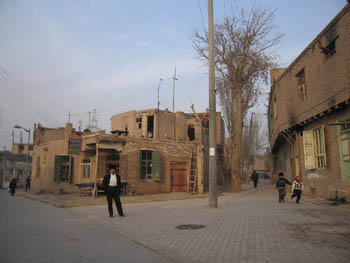
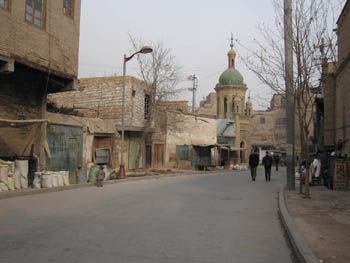
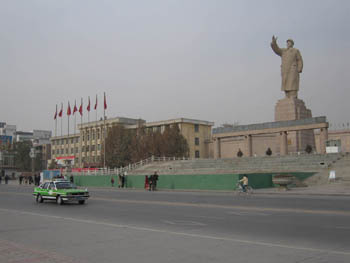
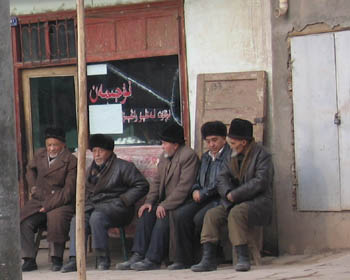
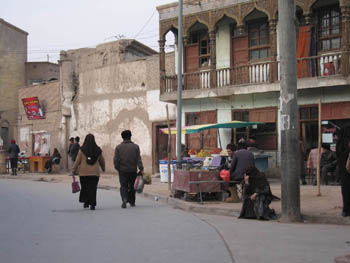
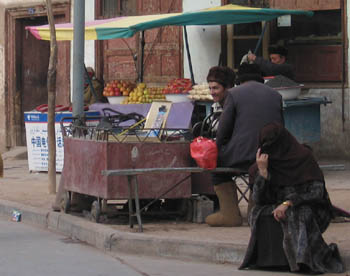
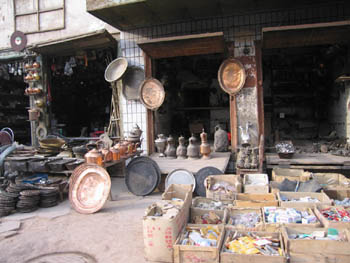
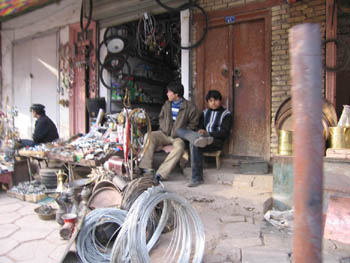
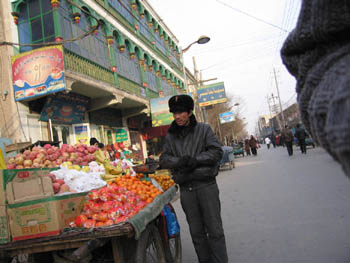
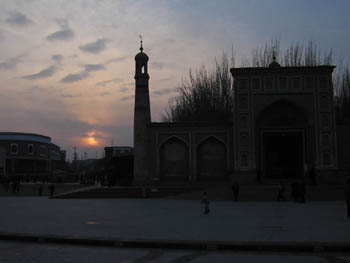
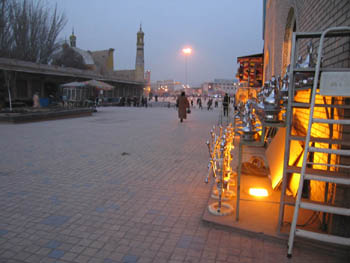
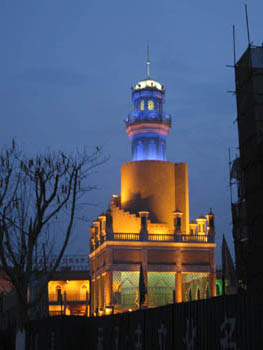
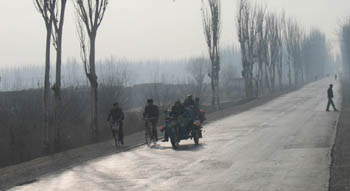
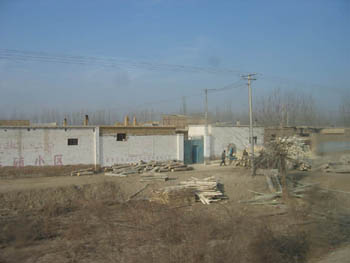
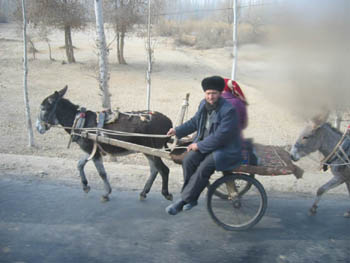
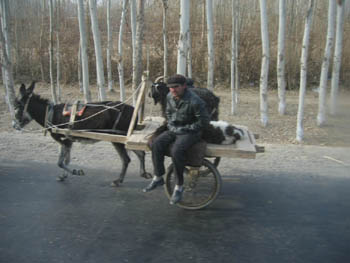
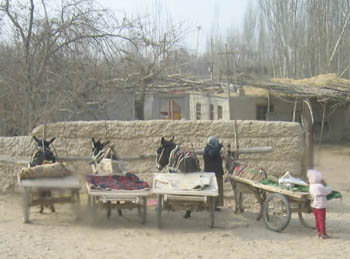
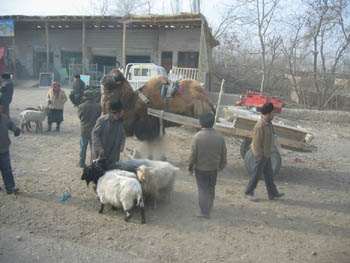
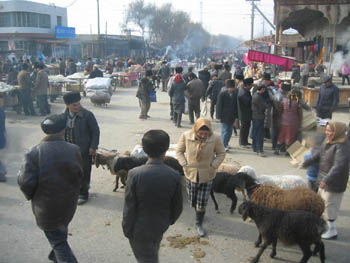
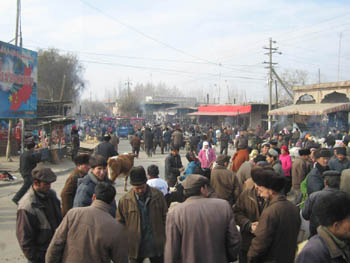
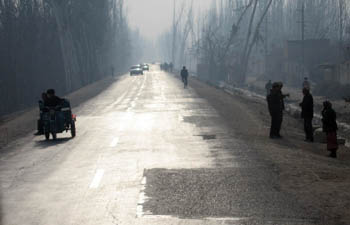
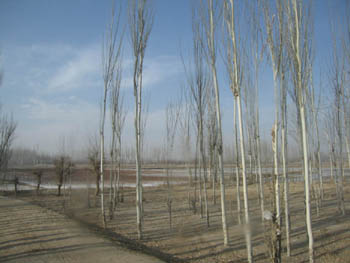
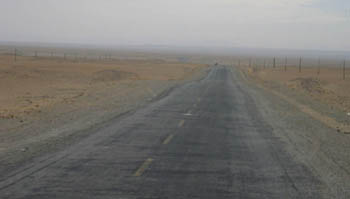
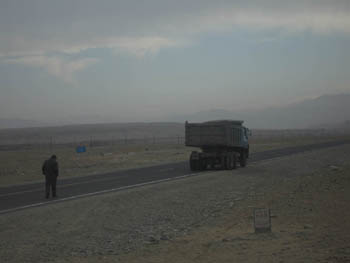
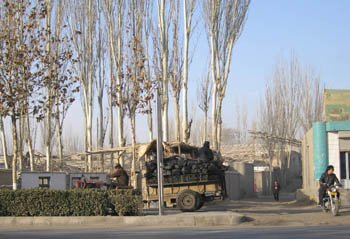
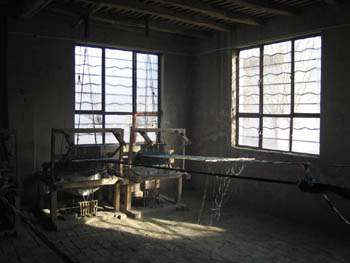
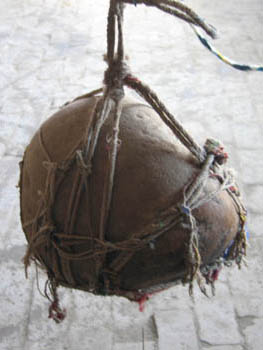
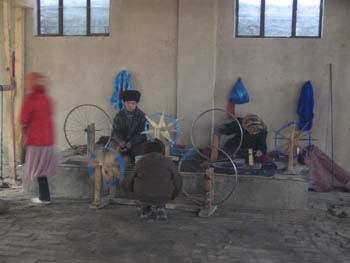
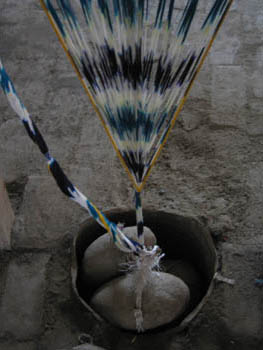
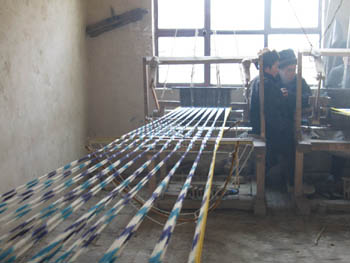
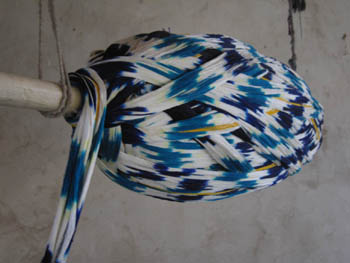
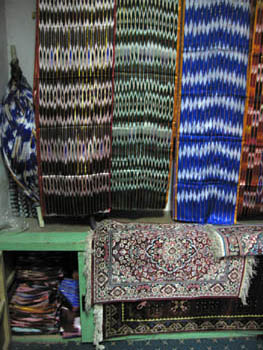
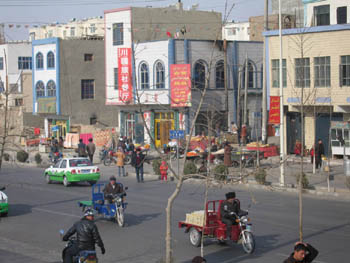
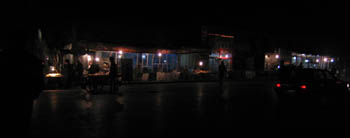
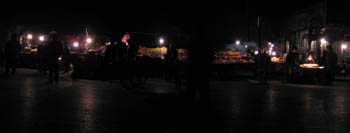
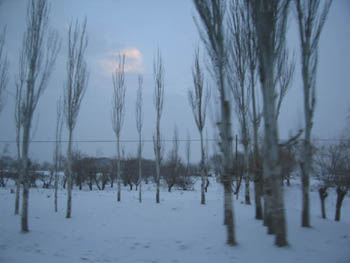
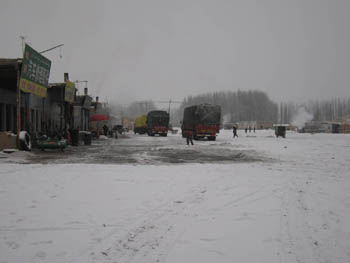
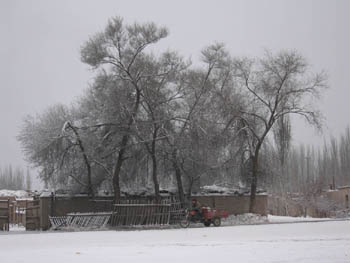
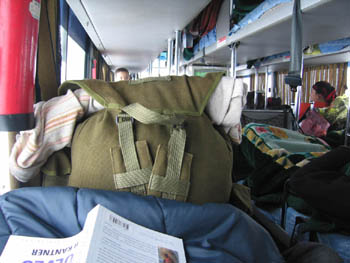
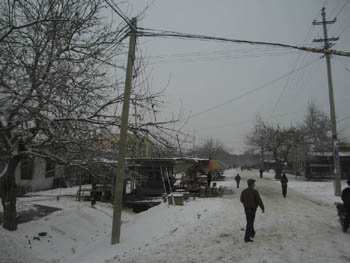
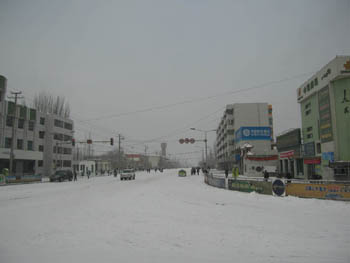
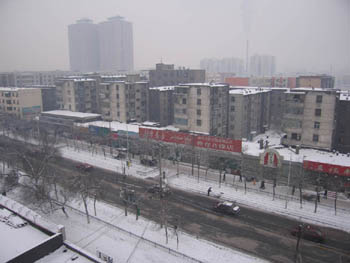
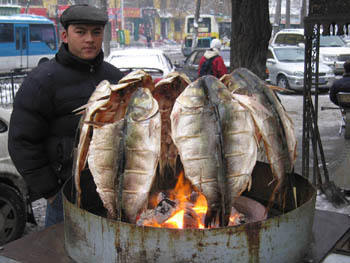
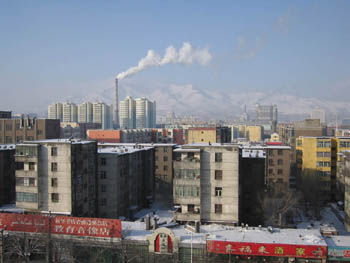
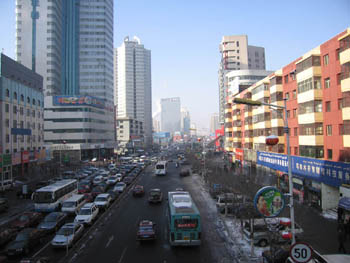
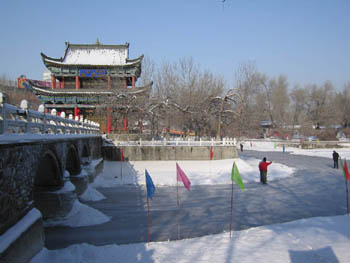
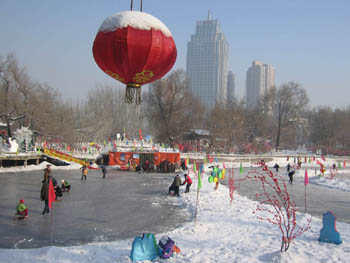
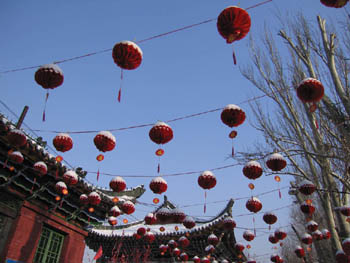
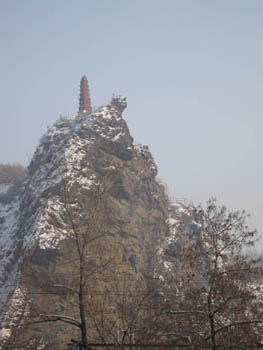
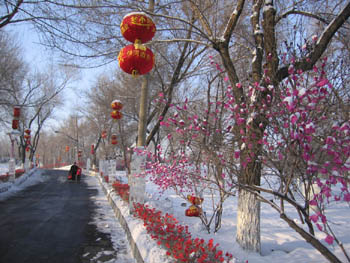
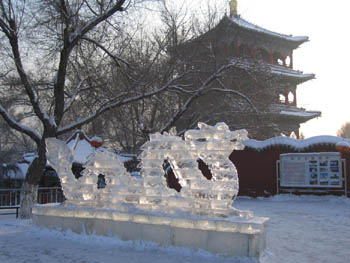
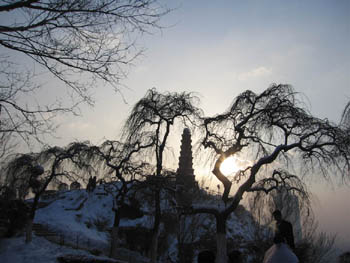
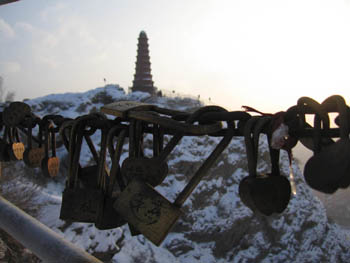
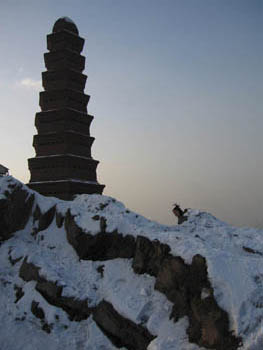
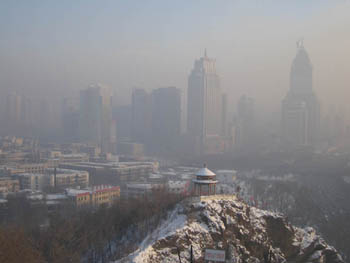
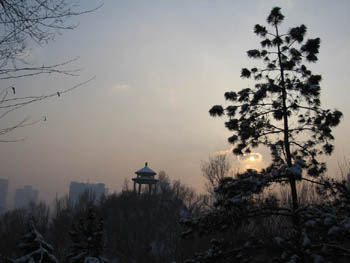
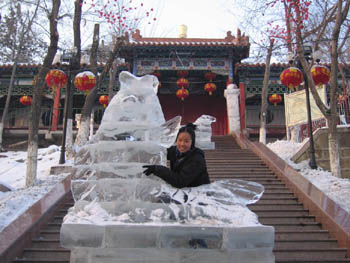
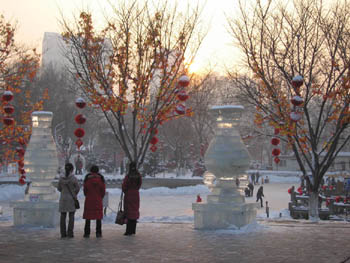
Once our bags were emptied onto the living room floor and the most exciting artifacts extracted from the socks and shirts were grouped on the kitchen table looking unfamiliar so far from their market shelves, I ceremonially pressed three more pins into my cardboard globe. They spanned an area the size of California and Oregon combined, brave explorers positioned along the Chinese border with Pakistan, Tajikistan, Kyrgystan, Kazakhstan, and Mongolia. That part of the world isn't properly Chinese - the people aren't much enamored with China or anyone who looks Chinese since the giant country has taken eastern Turkestan for its own - nor does it look Chinese. Writing is in Arabic characters, mosques appear throughout the cities, mutton is the meat of choice, every man of means owns a dark fur hat which he keeps with great care, and some women tread the streets faceless behind brown cloths. The music is Middle Eastern in flavor, the food is excellent, the transportation ranges from donkey cart to modern train, and in the middle of winter not a foreigner is to be seen for thousands of kilometers along the frozen roads. Seven thousand meter tall peaks of the Karakoram range rear up out of the haze along the southern edge of the Taklimakan Desert, a huge empty basin of sand and gravel the size of Montana. The high Pamir mountains loom to the west and snowstorms from the north sweep over the Tian Shan mountains and slow trucks and buses to a crawl. China is building, growing so fast that the capital city I saw 8 years earlier with bicycles and sputtering old Chinese vehicles now has hundreds of high-rise cranes lifting buildings and shiny new cars from Toyota and Chrysler fighting each other on the asphalt. Above the chemical haze, the Great Wall still slinks over mountains unchanged except for an occasional Starbucks coffee shop carved out of ancient stones.
It's complicated to explain why on a Friday afternoon in late December I was standing in a coal-smudged asphalt lot next to a camel carved from blocks of ice. Getting there and back was for me a simple matter of buying two tickets from Air China and getting a visa from the consulate in Los Angeles, but for the ice sculpture beside me there would be no hope of getting to a Southern California beach even if the temperature rose ten degrees to the melting point of frozen camel. No rivers drain to the ocean from Urumqi; high mountains and burning deserts trap the moisture and the nearest sea coasts of Russia, Pakistan, Bangladesh, and China are all more or less equally far away. That's one of my reasons for stopping in to visit: Interesting people must live in this place so far from ..well, almost everything.
China is full of interesting people. In Beijing, they clamored to sell me a fine selection of mass-produced button-down shirts and pirated Hollywood films. On a porcelain platter under sauteed vegetables they served me an endangered species of fish, their eyes glowing in anticipation of the soon-to-be-revealed price of their secret sale. In taxis they lost all regard for law and order, proving their power at eighty kilometers per hour passing on the right shoulder with two tires on the gravel. Restaurant meals arrived with exactly two small paper napkins delivered with reverence in decorated envelopes and every hotel room was supplied with one meter of toilet paper, no more. Paper evidently becomes a precious commodity once all the trees have been cut down to make room for fields growing two billion meals each day.
Now the farm fields are being converted into cities to house the apartments and offices of China's new middle class. People living in quaint brick hutongs and quiet farm villages want cell phones, designer clothes, and plumbing so construction companies have responded and are building a billion new offices and apartments. I'm not exactly sure where the water, electricity, and oil are coming from to feed the growth or where the all the trash and waste water is going, but I'm sure the officials would rather I not know. They're all hoping that somehow a population of sidewalk-spitting workers fighting man-against-man for as much capitalism as they can have will eventually settle down and be nice productive drones churning out the bricks of progress in a pristine city of the future. Personally, I wonder if the structure might collapse for lack of a sound foundation in resources and freedom to be resourceful.
One of the first things I noticed upon arrival is that Beijing is excited about the 2008 Olympics. Advertisements with that theme had their adhesive backs stuck to my airline tray table, the subway car wall, and what seemed like one of every three signs posted along the street. A new terminal was under construction at the airport. Roads were freshly paved but the lanes were already jammed full of cars, leaving me wondering what will happen when more cars arrive. We arrived early in the morning and Joy secured us a taxi to my uncle's apartment near the city center, fending off the high price of a freelance taxi with better Mandarin than I could hope to speak even if I'd studied since October. I hoped she wouldn't tire of me and leave me alone with my notebook, trying to pictorially communicate "I need one roll of toilet paper, quickly please" to a girl at the convenience store checkout while customers shouldered me aside. China is not a place where there are queues to wait one's turn.
My uncle had risen early to meet us. After he left for work we walked to the subway station and rode to Tiananmen for 3 yuan, the go-anywhere fare. Announcements were in Mandarin, then English and signs had either English or pinyin. The weather was cold and sunny with a light breeze that picked up dust from the concrete and blew it in our eyes. A line of red flags stood out brightly against the blue sky. People walked past from every direction and several security vehicles meandered around honking at a family sitting on the dead brown grass to take a photo and harassing two young men who had paused near a busy walkway. We walked through an underpass to the gates of the Forbidden City, no longer forbidden and instead sporting a large portrait of Chairman Mao and open for fee-paying visitors. Frigid wind was pouring through the gate tunnels and the moat was frozen solid; it must have been for looks more than for function because for a third of each year would-be attackers had only to walk across the ice.
Large iron cauldrons were situated throughout the palace in empty courtyards so devoid of color and life that one wouldn't be able to tell the season from a photograph. The cauldrons were once filled with water kept liquid by constantly burning fires to put out other fires if they happened to start in the wooden palaces. It would be a shame if the fine woodwork was to catch fire; the maintenance crew takes ten years to just to repaint the place. Hundreds of halls and courtyards each had a special purpose: study of medicine, or meditation, or administration. For all its grandeur, the palace didn't seem like a home that anyone could really live in comfort or contentment. It was too big and sprawling and colorless and flat. I imagined the emperor looking out into the bleak gray courtyard thinking to himself, "It's freezing out there, but I really don't want to stay here in the Hall of Studying Herbal Remedies all morning. It's too bad the Hall of Roasted Peacock Tongues is all the way across the palace!" I'm sure he just chained some concubines to a sedan chair and made the trip in relative comfort though; such were the ways of the place according to the informational plaques. The translations are riddled with humorous errors but they're cast in bronze nonetheless beside their Chinese equivalents. We wandered from hall to hall until hunger coupled with fear of the unpopular noodle pots reheated countless times sent us in search of food, back out the way we'd come.
A map in Joy's book bag and a bit of luck brought us to a busy street lined with retail establishments and large department stores. The latter were a good find - inside it was warm and restaurants and bathrooms were plentiful. Our greatest difficulty was finding a menu we could understand well enough to order from. We passed up several places over that concern and finally settled on a hotpot restaurant. The wait staff rummaged under the counter and produced a menu with English translations but that was still not enough to save us from misfortune: with the plates of greens and shrimp and mushrooms came a saucer of neatly sliced Spam, quivering and mushy and beige and not at all like the rolled shaved pork stacked high on our neighbor's plate.
Content that the hotpot would annihilate all microbial evil that might lurk on our food, we ate a good meal and proceeded to a bakery and a pharmacy before moving back out into the cold. A KFC truck pulling a covered wagon with benches crept past, music and posters of oversized juicy fried chicken morsels luring hungry customers in for the ride back to the nearest franchise. When emerging from the International terminal at the Beijing Capital Airport, the first things you'll see are a Starbucks and KFC. They've both done well in China. We walked to the Silk Market, a multi-level store attempting to sell all known consumer goods especially to people who looked foreign like myself. Later we went to my uncle's office at the top of a tall new building. For dinner, he took us across the city to the China Club - one of the most prominent clubs in the country. It was a taste of an older Beijing: leaves skittered across quiet inner brick courtyards where orange lanterns hung and threw twisting shadows of gnarly pines against the walls. Behind the windowpanes people read in den-like rooms amid bookshelves and carpets on dark woodwork four hundred years old. I could imagine the warm haven amid silent frozen hutongs - Beijing's old brick courtyard homes - but new brightly-lit, granite faced high-rise buildings peered in from adjacent lots, waiting for the old way of life to wither and die.
There was much opportunity for sleeping on the flight from Los Angeles: we took off at 1am and chased the night west for twelve hours to land before sunrise in Beijing. Despite this, in my aisle seat I never did get much rest so while I had managed to stay awake through the day, I was out until midmorning the next day once I got to sleep. Joy had managed to get more sleep on the plane but I heard not a single murmur of complaint at sleeping late. Towards noon we emerged into the crisp winter air, walked to the subway, and took the train two stops counter-clockwise on the loop that rings central Beijing. The stop was adjacent to the Lama Temple - a Tibetan Buddhist complex - but though we could see the temple walls and vendors selling incense there was no way to get inside. Trying first one direction, then the other we circled around to the south side where the main entrance had been recently fitted with turnstiles and bar code scanners to handle the huge crowds of summer - and the Olympics, I presume. Our tickets even arrived with small informational CDs. We kept them but exchanged our plastic bar code cards for paper cards each labeled "souvenir ticket" as we passed through the not-yet-working turnstiles. Inside the temple things had also changed dramatically from when I visited eight years earlier. Burning incense was no longer allowed inside the ancient wooden structures, only in iron boxes outside. The fragrant, hazy atmosphere cut by light from the windows and seeping among people kneeling for prayers was gone, an empty dark void hanging cold in its place. Huge smoldering incense coils once hung from the ceiling, filling the space. Monks tended every hall and watched for cameras - I wonder why they couldn't watch for sparks as well?
After leaving the temple past a large metal bell next to another poorly-translated placard that mentioned how the temple and bell were well cared for by government officials who "appreciated its cultural value" during the "turmoil years of the so-called Cultural Revolution," we walked west through gray brick hutongs - Beijing's old tile-roofed courtyard homes clustered together wall-to-wall with narrow alleyways threading through. The hutongs have no plumbing but toilets in new concrete buildings were installed at frequent intervals. Trash and slop were poured into storm drains but since it was mid-winter and well below freezing the dishwater had solidified in spreading mounds with noodles meandering along the pavement and cabbage leaves paused in contemplation of wilting. Aside from these unpleasantries of traditional living - and it wasn't bad at all with slop all frozen and the air fresh - the alleyways were lovely, hinting at how it used to be before the high-rise cranes and foreign cars arrived. Men delivered coal bricks on tricycles, people bought steaming bowls of noodles at restaurants, and the slanting sunlight filtered in through bare tree branches. Eight years earlier I'd been inside a brick home outside Beijing; it was neat and tidy despite the crumbling walls. I'm not sure I'd want to live in one, but the fast-disappearing neighborhoods do hold a key piece of Beijing that you shouldn't leave without seeing.
The weather was still cold, and the wind kicked up dust that stung our eyes. On the bigger streets cars barreled down relentlessly on pedestrians, horns blasting. Joy's new Sorel boots were rubbing her calves; her socks were too short. We ate some granola bars on a bench, looked at our map, and decided to press on to the Bell and Drum Towers. Aligned with the roughly north-south axis of Tiananmen and the Forbidden City, these two ancient towers loom above nearby hutongs. We climbed a steep tunnel-like stairway ten or twelve meters up to the drum room of the Drum Tower and looked around at all the giant cowskin drums. They looked like huge wine barrels. Our timing was lucky: attendants did a drum performance while we were there. The air resonated with big sound, satisfying like a massage. Afterward we stepped out from the unheated tower to the bitterly cold windy balcony. Beijing was all around us. Making my way around the perimeter I counted fifty-five high-rise building cranes in sight, assembling new office buildings for the new capitalist China. Nearby hutongs had been reduced to rubble; the gray bricks and tiles lay in heaps beside intact but nervous remnants of villages bisected by four lane asphalt roads. We took the asphalt roads back to the train, hurrying in the light of the setting sun to get back to my uncle's apartment. Later in the evening he took us out to a nearby restaurant called the Bellagio. It sat on a strip with many nightclubs that had just appeared months earlier and were busy every night. The restaurant did smart business too; with sleek, modern decor and waitresses with modest cropped hair it served delicious fresh chilled pressed juices, desserts with shaved ice and fruit and wonderful ice cream, soups and all sorts of other meat and vegetable dishes. It stayed open till 4am.
My uncle hired a driver to take us to the Great Wall and Ming Tombs so we wouldn't have to trust a taxi not to abandon us. He met us at 8am and set out at a completely reckless speed, driving the late-model black sedan with tinted windows on the wide paved shoulder for minutes at a time and weaving through traffic, honking incessantly. Fog drifted among skeletal buildings and cranes silhouetted against the sun. The road became less crowded as we hurried north a little more than an hour to Mutianyu. That section of wall has been restored but is more rugged and less of a tourist show than Badaling, the latter being frequently visited since it's close to the Ming Tombs. Few people were around and the vendors of hats, shirts, statues, and other souvenirs were just opening their stalls along the approach to the wall. We bought entry tickets and decided to walk up rather than take the cable car more out of confusion about how to get on the motionless cable car than a desire to walk. But, it was a pleasant walk and the temperature was not cold at all, just a few degrees below zero Celsius. By the time we got to the wall the chair lifts were running. There was also a metal luge-like slide that went down about 100 meters over trestles and around corners, an alternative to walking down or taking the cable car. We had most of the wall to ourselves in the warm sunshine; it was a beautiful day. Walking west we passed tower after tower, each one built slightly different to confuse attackers. As we climbed higher we could see the old wall ahead with trees growing on top of it, the towers crumbling and strikingly beautiful. That section was half a kilometer farther and a hundred meters higher though so we decided, after sitting for a while in the warm sunshine, to go down and continue with the day's plan.
We took the cable car down, for a fee, and at the bottom Joy asked our driver to take us on to the Ming tombs. It was midday and we were getting hungry, so we invited the driver to eat with us at a restaurant somewhere. There were no restaurants on the long, winding rural road that climbed through rugged hills and peach orchards kept neatly on terraced hillsides. In the distance, the Wall slithered over mountains and valleys. Poplar trees lined the roadsides. I don't particularly like tall thin poplar trees. A tree should be spreading and robust, strong, and gnarly - not slender or timid with its branches held close to its trunk. Or if a tree is to be elegant, it should let its branches flow like an elm or a willow. Perhaps dry, cold central Asia is too tough for such trees because only the plain spindly poplars grow in abundance. Or, perhaps only the fast-growing soft pithy poplar wood is undesirable and tenacious enough to survive in this crowded country hungry for chopsticks, rafters, and paper.
The Ming Tombs are in a valley - the Valley of the Emperors - with tombs from many Ming emperors. All of them have been emptied of all relics and some are open for tourists. We went only to the largest one which belonged to Ding Ling. There really isn't much to see there, winter or summer, just like eight years earlier. In winter the gift shops and buildings have military olive drab quilts or clear vinyl dust curtains hung over doorways to keep the cold out. The tomb is plain and unremarkable except when one thinks about how it was cut with hand tools hundreds of years ago (the office-building stairway and electric lighting makes imagining this difficult). We had to walk through a metal detector and send bags through an x-ray machine on the way in but the metal detector wasn't detecting metal (I was wearing plenty of it) and if the x-ray machine was scanning bags, no one was really checking on it. Of all the spectacular sights in China, I think a nearly empty underground stone vault shaped like three adjacent mailboxes with short tunnels between them would be the least likely to be vandalized or attacked. And if it's the safety of visitors they're trying to protect, I think they should enforce traffic laws instead.
There was a restaurant nearby that our driver seemed to hesitate at before deciding we should eat there. It looked normal in front, with an odd name - "Spring Sauce Restaurant" but inside we were led through a maze of passageways to a private room built from what looked like surplus blue-tinted glass and aluminum extrusions from an office building. Having a private room seemed very un-restaurant-like; I wondered if captive maidens would be presented to us after we ate. The menu had an English translation scribbled on a sheet of paper; from it we could see that the prices were roughly twice what we'd seen in the city but still not unreasonable by Stateside standards. Two waitresses helped us with the menu. I chose a pork dish. The driver was saying something to us agreeing about a mushroom dish. The waitresses offered "steamed fish, no bones, you want." That sounded good - a fillet of steamed fish. Joy asked the price amid all the confused conversation and didn't get an answer. All food we've seen is cheap, we reasoned, and so we waited patiently sipping tea while Joy chatted in short sentences with our driver. The dishes began to arrive. They weren't great, just on par with fast food Chinese at home. Our fish arrived on a platter, looking nothing like a fish fillet or even an ordinary fish. It was black with twin rows of ridges on its back like a stegosaurus and a sharply pointed flat snout like some ladies' high-heeled shoes. In its bed of sauteed vegetables the foot-long fish looked edible enough and it tasted quite good, but we became suspicious when the waitress kept poking her head in to say something about how great the fish was and how its bones were soft and could be eaten. We finished most of the food, our driver went out a couple times to smoke or talk on his phone, and when the bill arrived we discovered that our fish was four times the cost of the other three dishes combined. Back home I identified our strange fish: I'd feared it might have been a worthless creature from a drainage ditch sold deceptively as a delicacy but fortunately (for our self-esteem, at least) this was not the case; instead we'd eaten an internationally protected species of juvenile Chinese Sturgeon. Dubbed a "living fossil" for its prehistoric form, juvenile fish just about a foot long had been stocked in Chinese rivers not long before our visit in an effort to save the species from vanishing. Ours never even had a chance to reach its full length of a meter or two. The Chinese government is not particularly focused on conservation, having enough trouble caring for its people without even considering its frogs and fish, and the people have long believed in eating everything that moves too slowly to escape so in true Chinese style we lunched on an endangered species, walked down the grand entrance to the Ming Tombs past the pairs of stone statues, and headed back to the city.
Along the way I kept watch for American-made vehicles. In 1997 I saw just a handful of foreign cars around Beijing; the taxis were sputtering yellow Chinese-made vans and cars and the trucks were all lumbering blue monsters. Some of those trucks remained, but nearly all the cars were new. Volkswagons and Acuras and Toyotas were everywhere. I pointed with excitement when I first spotted a Jeep Cherokee, before I realized they were everywhere. There was one Chevy Blazer, and the KFC trucks had been custom Fords. Either the import tariffs went down, or many people got very rich very quickly.
My uncle worked late trying to get things done before he left for New York. We packed up, then once he got back from the office we went out to another nearby restaurant and called it a night. The next morning my uncle left early and we followed soon after, taking a taxi to the airport for two thirds of the amount it cost us to go the same route in reverse. New foreign arrivals are always subject to fake fares. We were early and the plane was late. The new domestic terminal was very nice and in the distance across a sea of concrete the red steel framing of an expansive new terminal was nearly complete. Once our airplane did depart, I watched the brown land fall away and snowy mountains drift past beneath us. The Chinese films were colorless and so was the desert below, though the Gobi showed some dramatic textures where snow tipped vast areas of dunes and erosion channels.
Four hours later as we glided over the Tian Shan range I peered out searching for Tianchi, the lake we probably wouldn't see because it's high above the plain beyond snowy roads. And, it's completely frozen over and probably riddled with the tracks of snow machines - not quite the crystal blue paradise it would be in summer. Judging from pictures, the lake wasn't remarkable at all by Canadian or European standards, only compared with the vast deserts and dry mountains of Xinjiang. The ground below was covered by snow and above that, by a tenacious white fog that stretched from a thousand feet all the way down to the ground. Under it, the terminal looked ghostly and cold. The air outside had a sharp chemical bite; coal soot and other pollutants wafted down from stacks throughout the city. Our taxi again charged a high fare as we silently hoped we were being take to the train station. Uneasy in the new place, Joy told me to be silent so we wouldn't immediately be discovered to be American; who knew what people would think of that. As far as they knew, we were Chinese and Russian.
Once arrived safely at the train station, we hustled inside past beautiful ice sculptures ringing the parking lot. Tall displays of red lights listed the trains by number and with Chinese characters. We stood in lines attended by uniformed men - the only reason there were actual lines - and finally got the the ticket window a few minutes later just ten minutes before the scheduled departure. We would have to book the next day, said the girl behind the glass. That done (506 yuan each), we stepped outside to cool our nerves and have a look around. Once past the taxi drivers calling for passengers, we weren't even noticed. The snow was covered in black soot. Stacks of ice blocks cut from a lake were being chainsawed into smaller blocks and chiseled into horses and camels and foxes and people and castles. Overhead, the white fog blocked any indication of the time of day. People dressed in plain dark colors, mostly black, but they didn't wear bulky clothing or big boots or puffy gloves. The temperature was negative twelve Celsius and the air was still; not bad if only the air was fresh.
Across the dirty asphalt lot I spotted a hotel right next to the train station. Joy checked the rates - they offered rooms by the hour too... and we asked to see a room. It was on the eleventh floor looked neat enough, so for the equivalent of $20 (winter rates) we stayed the night. Train whistles were muffled and infrequent. The water turned out to be lukewarm until morning when, I suppose, enough people turned on their taps to warm up the cold pipes. Dusk fell around 5pm. Armed with a photocopied map we walked toward the city center, dodging cars and trucks and trying not to slip on the sooty ice. There were fruit sellers and little grocery shops and, at the first corner market we came to, men were flipping flat breads out of a hot clay oven. Right away I bought one and we stood back a few paces to eat and watch. The bread was wonderful, seconds from the oven but cooling fast in the night air, tasting like the onion and oil brushed over the dough. It was like a pizza without any toppings, flat with a raised edge. Men rolled and spun dough back inside a booth and out in front, another man hunched over the glowing round opening of the oven and tossed dough inside. They would be retrieved after a bit with a long wire hook and flipped steaming onto the small heap of bread for sale.
Later I got a closer look at the clay ovens and the way the breads were baked. The ovens are wooden boxes one meter on each side, sitting on the ground. A clay urn sits in the box, and the space between the clay and wood is filled with sand. A fire is built in the bottom of the urn, and once it is very hot men reach in with steaming hands and slap dough onto the sides of the oven. It sticks there, the rolls upside down and clustered together like bats in a cave, browning in the radiant heat from below. The flat nan breads are baked the same way, as are bagel-like creations and meat-filled pastries. The smaller ones are scraped off with big metal ladles and most of the breads have little bits of crumbly gray clay clinging to the back. I'd build my own oven if they could be warmed up fast to bake dinner for two - but the clay oven remains a short-lived way to bake bread (the clay eventually cracks and lets the sand in) and besides, without the mutton fat and onions it just wouldn't be the same. And I've already got my heart set on building myself an Italian brick oven for pizza, which unfortunately can't be baked upside down.
Next to the nan bakers a kebab seller was stoking the coals - coal coals; everything was coal fired - and grilling sheep various ways. We moved on to see what else there was to see and eat as the last of the day's light faded behind a billowing smokestack that looked ghostly in the acrid fog. The evening bustle faded fast on one street and the next one we tried lasted only a block farther. In between our forays beyond the corner with the bakers we ordered skewers of lamb shank which were cooked and expertly seasoned before our eyes beside speared hearts and livers and lumps of sheep rump. The meat was good with the herbs they sprinkled in from a bag concealed on a cluttered table. After returning our metal skewers, we moved on. In front of a bank men with flak jackets and automatic rifles steered me away with gruff words as I was about to cut across the steps. They must have been moving money because we didn't see fruit and more bread. The second bread wasn't as fresh or as flavorful as the first, so I bought another of the good ones as we passed by with our day's catch of oranges and a watermelon.
Back at the room I cracked open the melon. We had only one spoon and no knife so competition was fierce for the fantastically sweet and juicy yellow melon that was familiar watermelon from peel to peel except for the pale yellow color. Then we slept, waking twelve hours later when day broke around 9am. It looked cold outside; a stiff wind from the west had blown the fog and pollution across the city where it pushed back impatiently like the San Francisco fog, waiting to creep back in and stifle the city. Down below men were back at work on the ice sculptures and people were out milling around and catching buses and opening their shops. We steered clear of the tea eggs stacked over steaming murky water and coal burners - many cases of bird flu had appeared in local fowl and we weren't keen on being the first human carriers no matter what they said about cooked poultry and eggs being safe.
We bought some pale green raisins from one of the many identical dry fruit and nut vendors. Everything seemed to be 20 yuan per kilo, not as cheap as other food. There were raisins of all colors and dry orange and yellow plums and peaches and walnuts and pecans. Around the corner we asked to see what was being steamed in big hooped steamer trays. Fat white dumplings made our eyes glow and we followed eagerly when beckoned inside. Behind the plastic doorway curtain the room was warm and the people were friendly. We sipped tea from bowls and Joy talked to our two hosts in broken Mandarin. A small tray of six apple-sized dumplings arrived, each round and plump and full of piping hot chopped mutton. They were delicious, so much that after a brief search down the alley and around the corner we returned for more. Joy liked everything to be fair - split costs, split responsibility, no inequality of orange distribution. The problem was that then when she was full I would still be hungry, but I wouldn't want to find a place to eat and sit there finishing everything myself. I ate a bigger share of the second batch of dumplings. A few doors down we walked through a raisin warehouse where sacks were stacked two meters high on pallets filling an entire room, tons of raisins. Men were buying cart loads of raisins. I wondered who could possibly eat them all.
It was a slow day waiting for the train to leave. Check-out was at 2pm, noon local time. Our train would leave just before four o'clock so we sat with our bags on the station steps in the sunshine until the low southern sun disappeared behind a cold granite wall and the chill forced us inside. In one of the expansive waiting rooms we watched hundreds of people press toward the gates in a calm rush to get seats on another train once it began boarding. A young man who worked at the station or on the train chatted with Joy for a while; his shift was done and he'd taken off the uniform jacket and was heading home. I showed him the photos Joy and I had assembled showing California scenes, our apartments and families and cars and cities. I also had some maps, prints showing whole continent. Our companion didn't know of San Francisco or Los Angeles; he seemed to know California but he didn't know if it was in Asia or North America - or maybe even what was different about the two - when I unfolded the maps. We wrote out a note on a postcard with a picture of the Golden Gate Bridge at sunset. "Hello from California. ...maybe we will see you in Turpan." The icon would mean nothing to him but just the bridge would probably be interesting enough; there isn't a body of water that large anywhere near Urumqi.
Our new friend became attached rather like a barnacle after that; he put his uniform jacket back on - though the pants didn't match any more - and shepherded us to the train once it arrived. His car was farther up but he kept coming back which was a bit of a bother since we couldn't really talk to him. Our cabin mates were a grandmother and grandfather and their grandson who looked to be about four. They spoke Uyghur and we didn't try to converse, but on one of his visits our friend explained to them the basics of where we were from and where we were going. They smiled and nodded to us. We had top bunks, which were more cramped and quite inconvenient to get in and out of when strangers were below, but we'd figured on them being safer. There were beautiful views of the mountains as we crossed the Tian Shan by way of tunnels and passes. Not a plant was in sight. Farther on, there was snow and little else but sand and gravel. The railroad ties were concrete. The train reversed at Turpan - or rather, fifty kilometers north of Turpan - and branched left to skirt along the north edge of the Taklimikan Desert. In Uyghur the name means "He who goes in does not return."
Darkness lasted long hours. We bought cups of noodles and filled them with hot water from the perpetually steaming vacuum bottle in our cabin. The Chinese have discovered how to make hot water bottles with zero heat loss. We slept and woke and still it was dark. Joy seemed far away across the narrow train cabin. It got stifling hot at one point and I was very thirsty, but I didn't want to get up and besides, the drinking water was hot. At Aksu at 3am our cabin mates departed, having slept some and kept the door closed and locked most of the time. We were much relieved they didn't smoke; some cabins wafted pungent tobacco smoke and no one minded despite the "no smoking" signs. For the rest of the ride - another eleven hours - we had the cabin to ourselves. It was nice to have the space especially after sunrise when we couldn't sleep any more.
The train only stopped for a few minutes at most stops and there weren't many of them. There didn't seem to be any announcements of upcoming stations and the desolate landscape outside glided past at about 50 kilometers an hour, sometimes snowy and sometimes just bare sand and gravel. Only the clock on my phone saved me from being lost in a timeless void of sand, snow, concrete railroad ties, and the quiet rumble of iron wheels on iron tracks. I slept restlessly, uncomfortable from heat or thirst or the tight space and always faintly concerned about my bag being snatched. The morning sun brought an end to those fears and to the restlessness, since we had the cabin to ourselves, but outside the landscape was the same as always. By midday we'd figured out that a switch on the wall turned on speakers that played music and occasional announcements of upcoming stops. An attendant brought us our tickets, which were stored in a binder so the crew would know who to wake before each station, and between that and the announcements we realized we were almost to Kashgar.
The landscape was still muddy brown and frozen with leafless poplar trees and mud brick homes. Even cemeteries had mud brick monuments and what looked like caskets made from mud - wouldn't they just wash away when it rained? We arrived suddenly at the train station, a very Soviet looking cold expanse of concrete and tile with another tall coal stack billowing white haze not far away beyond the train. It was the end of the line; everyone got off and we all made our way through a queue where our tickets were checked. Beyond the gates we were thrust into a sea of taxis looking for fares. Joy's guidebooks advised us of the approximate in-town cost and again we were first quoted a much higher price. The next taxi driver had a better price but wasn't particularly friendly and took us to the wrong hotel. I carried our bags ten minutes across town to the Quinibagh where we booked a room for two nights.
The Quinibagh is a concrete building several floors tall with a white tile facade and paved courtyards. The rooms were plain but the water in our bath was hot and we happily washed up and stowed our bags in a corner. Resting would have to wait; across town the Kashgar Sunday Market was under way and we wanted to see it before people began heading home at the end of the day. Every guidebook and travel report said the Sunday Markets were not to be missed. We walked through an older part of town on the way. Rounding a corner we came upon a sight that at first glance could have been from seventeenth century Europe. Dark coal smoke billowed out of a haphazard collection of stove pipes, white steam rose from cauldrons and steamer baskets, meat sizzled on grills and hung from hooks, vegetables and fruits were stacked high on carts, and bakers turned out breads and mutton-filled pastries from clay ovens. Donkey carts clattered among the people and occasional cars and everyone wore dark colored clothes. Men - all of them - wore dark fur hats. The buildings were made of mud and wood and corrugated metal and brick and concrete. Along the way, men hammered copper and iron sheets into pots, planed boards for making steamer baskets, and sold all sorts of goods, hardware, and junk.
There were rolling pins and spindles turned by a lathe shop, all done in creamy white poplar wood. Stirring constantly, vendors roasted peanuts in big iron cauldrons over coal fires. Melons of many colors were for sale alongside oranges, bananas, pomegranates, and some grapes though most of the grapes were being sold dried to raisins. As we walked, a man driving a donkey cart tried to sell us a ride to the markets. He was friendly and very persistent but we knew it was very close, we wanted to look at things along the way, and we already looked too much like tourists. That was unavoidable; we saw thousands of people and only one other couple from outside the region, probably from Europe, but still we hoped to maintain a low profile. Riding a donkey cart to the markets would more or less emblazon a banner across our foreheads saying "gullible tourists with money.
After winding our way through more narrow streets and past the mud minarets of a mosque we rounded a corner, keeping far from a rooster parading around his stretch of roadside hopefully free of bird flu, and looked down a slope over the markets. A huge crowd of people had gathered, mostly men in dark clothes and dark fur hats, filling the streets and clamoring to buy everything from shoes and clothing to hardware and produce. In giant cauldrons, skinned sheep heads and other parts of sheep not commonly eaten at home had been stewed until bleached and faded to white and tan and yellow, making a sickly looking soup that people nonetheless ate. Motorcycles, trikes, and occasional cars honked their way through the melee, the drivers calling "posh posh posh" meaning "get out of the way." We waded in, trying to watch our bags and pockets and everything else at the same time.
Food and hardware is sold on the streets and clothing and scarves and other household goods are sold inside a covered structure which is at the center of the sprawling markets. Outside, we weren't noticed at all. Inside, a person in every stall would insist we look at something. Many of the silks and silk-wool blends were proudly marked "made in Italy" or "made in Turkey." Ordinarily that would have seemed more attractive to me than "made in China" but for once, I wanted the Chinese goods. We bought some scarves (the prices were good, though not extraordinary) using written numbers and Joy's Mandarin. Some people were willing to bargain but others refused; in any case it seemed silly to be arguing whether a knit scarf was three dollars or five - we could easily afford either price.
I was thoroughly disoriented after a few times around the market but Joy remembered the way out. The sun was sinking as we skirted around the rooster once again and walked back through the mud brick alleys to drop off our blankets at the hotel before going out in search of food. Donkeys and their carts were hurrying home, hooves clattering on the asphalt alongside speeding cars and trucks. It was dark by the time we left the hotel again for dinner. At the Uyghur food market we'd passed earlier, men were scooping piping hot breads from clay ovens and stacking steamer baskets in towers, filled with dough balls. We ate mutton kebabs, good meat unlike most of the kebabs for sale which were actually just mutton fat, and then sat down at an outdoor table with five or six Uyghur men to eat a plate of baked pastries stuffed with chopped mutton and mutton fat. Fresh and hot, they were wonderful: the crust of each small lump of bread was baked to a golden brown and inside the filling was like hot soup, juicy and flavorful. Our companions at the table watched intermittently but otherwise took no notice. They're probably accustomed to visitors in Kashgar since the place is overrun with them in summer.
I was still hungry but there weren't many options for food and I didn't want to go back to the same places again so in the end we bought some oranges and headed back to the hotel for the night. We woke at sunrise and emerged an our later, at about 11am Beijing time. Breakfast would be whatever was cooking in the steamer baskets - filled pastries, we assumed. Joy asked for ten thinking they would be small and the server seemed surprised, so we looked around and discovered that the fist-sized breads were actually huge - so we asked for five instead. They arrived fresh from the steamer basket, soft and white and twisted, with big bowls of tomato-mutton-vegetable soup. We looked around the large tables, inside a back room past the street-side steamers, at the Uyghur men and women sitting stoically over steaming bowls, eating with chopsticks. They tore pieces of the moist bread and soaked them in the soup. We did the same, slurping down the wonderful soup while a dubbed-over James Bond film played on a television in the corner. The clock on the wall said 9am; these people didn't care what time it was in Beijing.
We paid our $0.50 apiece and left stuffed and satisfied and ready for another day exploring Kashgar. It was early still and many shops were still closed. A post office was shown on our map and Joy wanted stamps for post cards so we walked there but it looked like it had been closed for years. It might just always look that way, but regardless it was closed. Nearby there was a bookstore where I bought a map and some books, including a cookbook. All the books were written in the Uyghur language which looks like Arabic and is printed left to right, back to front by our terms, but the cookbook had photo pages and I thought maybe some day I could have parts of it translated. Next we walked through the metalworking bazaar, where men hammered copper pots and galvanized steel stove pipes and sheet metal kebab grills and ladles and teapots and countless other things. Many were quite beautiful but we didn't have much room. I found a small copper bowl and we bought some hammered copper plates with designs engraved on them.
We carried our finds back to the hotel and set out again, this time south to the bus station where we bought tickets to Hotan on a bus leaving the following morning. Near the station a woman was selling roasted yams, which were delicious. I carried a metal sierra cup and a spoon in the roomy pockets of my insulated vest, perfect for such occasions. Of the many advantages of traveling in the dead of winter, big pockets ranks highly. We saw more of the mutton-filled breads we'd eaten the night before and bought a bag of them, discovering a short way farther down the street that once cooled even just a little, mutton fat sticks to everything: the roof of your mouth, your teeth, your tongue… it just wasn't the same at all. We were very getting tired of mutton, very quickly.
The markets were still busy, but the streets around the area were more open. It looked like the same things were for sale regardless of whether it was Sunday or not; I suppose more uncommon foods and handcrafts and, at another area, animals are only there on Sunday but for the touring visitor any day is good to get an impression of the place. Actually, the animals are never there at the central market; they're somewhere else to the south. We bought more cloths, thinking through who would get what back home, and returned to the hotel. Every time we walked that stretch of old town it seemed to get more ordinary, as if the magic of the place was slowly seeping out into the desert leaving only congealed mutton fat and acrid coal smoke. It was time to move on.
After a meal of Chinese-style dumplings (still filled with mutton) we walked back to the hotel. The sun had set and the orange sky was fading fast to darkness. The city's largest mosque was lit orange and blue; it was lovely especially with the rising and falling sound of evening prayers throbbing from beyond the walls.
Early in the morning I crept outside and left a ruffled-looking black imitation fur hat out in the courtyard on a bench. I'd bought it for Sean because he had requested one yak fur hat, and that particular one seemed to best fit that need. The nice black fur hats most men wore were costly - $50-70 each - and good quality, but after bringing Sean's sheepskin-lined hat back to the room wrapped in a plastic bag I discovered that it smelled absolutely awful, like decomposing raw sheep hide. Furthermore, since we had small bags the only way to carry the bulky hat would have been to wear it. I didn't want to wear a decomposing sheep for the rest of the week. There was a taxi outside the hotel and he took us across town to the bus station for an honest price - it was very low. The morning was cold and it was still dark. Our bus didn't leave for a while, but Joy found it outside and we climbed in with our bags. Seats were assigned, but since one seat was skipped to leave a place for the ticket handler, our seats three and four were separated so we sat together. That created cascading confusion as people arrived but none seemed to mind after they found a seat.
We left on time and began winding our way southeast over narrow poplar-lined roads. The sun appeared orange and faint through the morning mist, lighting the way for donkey carts and shadowy figures making their way along the roadside. There were many young women walking in small groups, colorful scarves on their heads. I wondered where they were going.. to work, perhaps - maybe there was a factory nearby that primarily employed women. We made slow progress as the ticket handler sought more passengers and negotiated prices but after the small bus was full we were off at a good clip. After a while large mountains emerged from the haze to the south. They were the Karakoram, rearing up to seven thousand meters at the edge of the desert. Camels grazed on invisible grass in the distance. I imagined Pakistan and India and Tibet just beyond the mountains, forbidden kingdoms just our of reach.
The haze swallowed the mountains and the desert swallowed the road ahead. Only hills of sand and gravel could be seen in every direction and to the north the land dipped down into the huge Tarim Basin. There was no way out but uphill; the bright snows of the Karakoram could melt and run down to the bottom of the basin but they would never escape from the desert as liquid water. After endless kilometers of barren desert we intermittently came upon poplar thickets and mud homes and people and markets. In one such forested section we passed a great many donkey carts stretched out over ten or fifteen kilometers. Sometimes they were so thick that traffic was snarled on the narrow road. Sheep and goats rode on some carts, produce on others, and some ambled on leading cows on ropes. Other carts were empty - there seemed to be a good balance of people going to market to buy and people going to sell. We came upon the market suddenly in a village and shot past without slowing, and after that all the donkey carts were going in the opposite direction.
Mountains appeared again to the south, this time the foothills of the Himalayan plateau. Tibet was beyond the hills, not far away - we might even have seen it in the distance. Lonely roads wound off into the mountains. The bus made stops so people could buy food and use bathrooms at roadside bus stops. Our ticket man was good about counting people before the bus left but still we never went far from it. We had to leave our bags onboard when everyone was made to get off so the doors could be secured and even though that was done to prevent thefts, we still stayed close and kept an eye on things. Finally by late afternoon, after eight hours on the road, we arrived in the most remote city in China: Hotan.
Located along the southern edge of the Taklimikan, Hotan is far removed from towns big enough to have concrete and steel buildings and bus stations. It survives on agriculture, silk, wool, and more recently, oil from new desert drilling. Hotan is particularly well known for its silk and carpets. Its long and colorful history as a major oasis on the southern Silk Road has now faded to a nondescript concrete town with colorful buildings and scarcer markets and restaurants than Kashgar. Only on Sunday does the town explode with goods and foods, according to our books. Maybe we just didn't give it enough time for exploring.
We walked from the bus station to the Hotan Guest House, a more formidable task for me since Kashgar because our two bags were about ten pounds heavier from the things we'd bought. We got a room in the nicer, new building. Hoping to stay two nights, Joy asked to reserve them but could only get one because the entire place was full for a tour the next day. This seemed impossible given the season and the practical limitation to the size of tour groups, but the next day we saw why it was happening: Canine units sniffed through the place, special mini-buses waited outside with capacity for about 30 people, black sedans with dark windows loitered in the courtyard, and security details paced around. The hotel was being cleared out for important people who couldn't be allowed to mingle with ordinary folks.
Tired from the long bus ride, we decided to book the one night and move the next day. This turned out to be the turning point that set us off on a long cascade of difficulties; had we saved ourselves the trouble of moving our bags midday we would have finished the trip according to plan. But, planned travel isn't always the most interesting way to go even if it is the least stressful. We set out for dinner with a rough idea of where the old town was, from Joy's map, but it became apparent after a while that the town wasn't old like Kashgar - the buildings were not timeless mud brick and there was no single street of food vendors. We looked around hoping to find something that wasn't bread and mutton and spotted a young man swirling a pot of noodles and vegetables over a fire in a side alley. Joy asked him some questions which seemed to confuse him (few people speak much Mandarin) but at least we could tell that yes, the food was for sale and we could go inside and eat. From the looks of the place, it could very well have been someone's house.
Inside there was the usual collection of tables and tea bowls and Uyghur men and women clustered around. Unlike the other places we'd been, here we were the center of attention. A ring of faces watched me in particular and talked. We smiled and talked a little in English, having no way to communicate. The meal was laghman, long round dough noodles topped with a soup of mutton and vegetables, a common Central Asian dish that varies throughout the year with seasonal ingredients. It was delicious! One woman understood Mandarin but didn't seem to want to use it. None of them believed that Joy was from the States, and they probably thought I'd picked her up somewhere in China. They asked if we were married, pointing to her hand and motioning to say "ring?" There were smiles all around but we couldn't tell if they were admiring, wishing the supposedly Chinese girl would stop invading their country, wondering what foreigners were doing in the locals-only restaurant, or taking offense that we weren't answering them - the women who spoke some Mandarin asked Joy if we understood what they were saying in Uyghur. She said no, but we could tell they weren't believing much of what we did communicate. Maybe it just seemed too different to be real.
After the bowls were empty and our three yuan apiece were paid we made a prompt exit, eager to escape from the circle of eyes. It was interesting to be immersed for a time in their culture, seeing what an evening in a remote desert oasis where "California" or "Hollywood" is more unfamiliar to the locals than "Hotan" or "Southern Taklimikan" probably is to you. Back at our luxurious - by Central Asian standards - room we enjoyed showers in a better bathroom than normal - though we still felt safer wearing our flip-flops - and went to sleep.
In the morning we decided to see what buses left Hotan and when so we could decide what we had time to see. The night in Urumqi had set us back one day so getting to Turpan would be difficult with the time we had left. However, a bus to Turpan was listed on the wall board. Joy asked how long it would take: "24 to 26 hours." We puzzled for a moment about why the bus to Urumqi traveled less distance (as listed on the board) in the same time, but since the far was cheap and the bus left late in the afternoon, we decided we could do a quick tour of Hotan and then take the bus across the desert to Turpan for a quick day's sightseeing there before catching a bus to Urumqi, a few hours from Turpan. It all made sense, and we got the tickets. That involved standing between railings at the ticket window as if in a line. However, people crowded in waving money and the attendant sold them tickets, first shove first serve. There wasn't a big crowd; people would just walk up and lean in from the side and get tickets. I could only block one side - behind Joy, or alongside at the exit - at a time so the intruding person would walk around completely inconsiderate of our efforts to get tickets. I was starting to get very annoyed but I tried not to be pushy since after all, some of those people might be on our bus in the end. Once when I was effectively keeping one man behind us in line while Joy was at the window, another alongside took his money and bought the ticket for him. Either they felt superior because Joy looked Chinese and I was foreign, or they just always do that. We saw the same thing at other places, and one can see the same selfish attitude in the way people drive. I desperately wanted to transplant the bus station and all the people in it to some small town in Nebraska where Middle America would rise up with righteous vengeance and teach the Uyghurs our own common courtesies and manners. Maybe they'd be just as irritated at that; we're all so different.
Next we hired a taxi to take us to a silk workshop and a carpet workshop outside the city, for 50 yuan. On the way we passed the Jade River where people trudged across a huge gravel plain searching for lumps of clear milky green jade which, if of the highest quality, could fetch hundreds of dollars for bits the size of grapes. There were more camels grazing along the way, and more streets lined with poplar trees. The silk workshop wasn't expecting visitors since so few came in winter but after we knocked on the door they showed us around the spinning and weaving room. Boys spun dyed fibers on wheels made from bicycle parts and blocks of wood, then wound them and wove them into scarves on shuttle looms with the warp stretched across the room. Large rocks were used as weights to keep the warp tensioned, and after every meter of progress the rocks had to be adjusted to let more warp off the spindle. It was fascinating to see how they worked and interesting to see the natural dyes used in some cloths. We each bought a piece of naturally dyed silk as a keepsake of the ancient silk tradition. The fabric is rougher than machine woven silk, but it has life in it.
A few kilometers back along the road we poked our heads inside the carpet workshop where rows of workers sat on benches hunched over carpets strung vertically between twin rollers like giant scrolls. With deft motions the men and women slipped loops of colored yarn through the warp and cut them off, making the designs and sewing the crosswise weft between rows of yarn. Every centimeter or two the yarn would be trimmed to make a nap of the correct height using shears that looked like hedge clippers. The scrolls could be advanced to move fresh warp into reach in what must be an incredibly slow process. No one was there to show us around but we found the carpet sales shop in a separate building. Men were there buying carpets that must have been specially ordered. I was looking at small rugs which cost 450 yuan - not a bad price considering the amount of work that went into the approximately 100x 60 centimeter rugs - but instead I bought a slightly more expensive, larger flat woven rug (without yarn nap) that is similar to the alpaca rug I brought from Bolivia. There's so much to know about Persian-style rugs - the yarns, the weaves, the designs - that even knowing I would get good quality weaving there at the workshop wasn't enough to make me feel like I was getting a fine textile piece.
This done, the major sights of Hotan were finished. There are ruins of ancient cities far outside the city, but they are only worthwhile for people with lots of time and good language skills. We walked through the markets looking at jade and clothing and food, hoping with the latter to find a good minimum-mutton meal. Joy spotted it at another street-side restaurant, small tortellini-like dumplings served in a vegetable soup. We each ate a large bowl even though the dumplings were filled with mutton - it was that good. Then, we retrieved the bags we'd stored at the hotel reception desk and walked to the bus station.
This time it wasn't clear which bus we should take. Joy asked people and got unclear responses; finally we were directed to a bus that said "Aksu" on the destination placard. I looked at the map - Aksu was half-way between Korla and Kashgar. It didn't dawn on us that we were going back the way we'd come rather than across the desert until the bus was under way. Then the sinking feeling set in - that way was so long, and so boring, that we'd never get to Turpan in 24 hours. The lady must have been wrong. And, we had really wanted to ride the cross-Taklimakan highway, the longest desert crossing on the planet by some descriptions. Express buses dart across to Urumqi in 24 hours, and our slow bus to Turpan couldn't possibly arrive in the same time. It actually went to Urumqi first and then Turpan, and involved two bus changes. I thought of getting off and fixing the matter at a thirty dollar loss per ticket, but we reasoned that it was best just to get back to Urumqi - and by that time, the bus was already out in the villages.
Furthering our unhappiness, right from the start we saw that the arrangements were going to be shady. An official checked our tickets as the bus left the station, making sure all had paid the proper fare. Then the bus stopped right across the street and a crowd of people swarmed on. The drivers and ticket men negotiated prices and goods and people were loaded on. The bus sat for ten minutes, then twenty. Greedy bus operators pocketed more cash. We should have gotten off right then but weren't fully aware yet that we were going west, not east, so we stayed and darkness fell as the bus moved in fits and starts off into the desert. It was a sleeper bus, two bunks high and three across, the aisles so narrow that I couldn't walk through them without turning my shoulders. It was built for small Chinese people and the average American would not fit at all. I'm only 5-feet-9 and 155 pounds. The bunks were like reclined bus seats but in a single piece with very little room for a passenger, much less baggage. Joy and I had managed to get our bags on despite the driver's protests; they lay under our feet so we each sat in a vee with our backs on the backrest and the bags under our feet. Boots had to be removed and put in plastic bags which were also way too small for my boots. And, there was no place to put them except on the bunk (smaller shoes might have fit in the tiny overhead compartment). There were big fluffy fleece blankets washed at some time in the distant past and they took up more space. We got ourselves situated and after covering everything with blankets it didn't look too bad, but there was only one way to arrange the bags and boots and legs and I had to stay that way for the next ten hours.
After a while the bus filled up and we began to make faster progress. There wasn't any room left, but still the cash-hungry drivers sought income. We stopped for a long time once and lots of people got off. I looked outside and saw them loading a cart load of sacks - ten or fifteen big grain sacks full of something - into the cargo area of the bus. These breaks were intermittent bathroom breaks as well - easy for me, but not for Joy. There was no such thing as customer service and we were careful not to delay the bus. At least there were two of us to keep watch; no one was counting passengers this time.
After an unusually long uninterrupted period of driving we passed more people out in the desert with nothing around. The bus stopped on the narrow road and talked to someone, then tried to turn around in a 3-point turn. The shoulders were soft and the bus, heavy with people and sacks of cargo, got stuck sideways across the road with the front tires in the sand on one side and the back tires also off the pavement. Distant headlights zoomed closer from both directions. A collision seemed imminent, and the wheels spun uselessly. To my relief the cars and trucks and buses passed on the sand - they didn't get stuck, maybe because they didn't have half a ton of cargo in the hold and more people than seats. People got off - everyone but Joy and me and a young man who had gotten on not long before. We looked at each other with sad smiles and decided not to move unless someone made us.
With everyone else off and some pushing, the bus got turned around, everyone got back on, and we drove a half mile back down the road to a spot where some people were gathered, turned around again in a hard-packed turnout, stopped briefly to talk to someone, and resumed our previous course. It was a fine example of the Xinjiang bus system: willing to do anything for cash, the drivers had overloaded the bus with people and goods and then tried to do something as ridiculous as a three point turn on a road narrower than the wheel base of the bus, at night, with soft shoulders, to go back the distance a man could have walked in ten minutes. We were stuck for ten minutes!
Farther along we came upon snow. The road was of course not plowed and the two or three inches of powder had been packed to a slippery layer on the asphalt. The bus slowed down a little but we made progress and came upon a mangled, overturned hay wagon being pulled by a tractor or trike-truck. It was also mangled and there was hay everywhere. A big tractor trailer truck was stopped adjacent to the wreck. The nearest medical help was hours away and I hoped the trike driver survived with just bumps and bruises. I tried to sleep but since we had the front row bunks the video screen and audio speakers and cabin lights were right next to my bunk and so was the door. The bunk was too small, and I had my bag and boots there too. The driver smoked frequently and other men came to the front to smoke also. There would be no sleeping for me even if I trusted people enough to doze off. Joy, however, did manage to sleep. I kept watch.
We passed the snow and continued around the edge of the desert, crossing great expanses of it between poplar-lined villages. I had thought that once darkness fell and the evening grew late that people would no longer be waiting for the bus, but still they waited and always we stopped. Once the bus was completely full however we plowed on through, horn blaring. Around 10pm we parked at a bus stop and everyone got off. Even though the bus was closed Joy and I took turns lurking nearby both to make sure the bus didn't leave and to make sure our bags didn't leave. The bathrooms were terrible brick caverns. Vendors sold food but we weren't interested or hungry. Joy went back to sleep when the bus resumed its journey and I tried to rest as best I could. Sometime before dawn we came upon more snow and crawled into Aksu where everyone got off except for one Chinese woman also going to Turpan. The three of us waited in the empty bus at the station while one of the drivers slept in a bunk.
A while later someone started pounding on the door. The driver didn't wake up, and I wasn't about to intervene since I wouldn't be able to talk to the men outside. Eventually the driver woke, men talked, and we were led off in a hurry to another bus that was full except for three bunks. I don't know how that worked out right; there is no way the bus system could be that organized. Aside from the uneasiness of changing to a dark bus full of new people and cramming myself and my pack down a too-narrow aisle, it was an improvement because in a bottom bunk I could put my boots below and stuff the bus blanket beside them, giving myself more room. Also there was more headroom. I may actually have dozed off for a few minutes here and there.
Dawn arrived to show us just how slowly we were moving. I had no idea how much progress we'd made but both Joy and I were resigned to the slow pace having thought through again and again every turning point when we should have known better. The bus stopped for a meal at a bus stop and people encouraged us to go inside, but we weren't keen on eating reheated food that was hours old. It would be a bad time to get sick, and besides, exhaustion and apathy had set in and neither of us was very hungry. We nibbled on granola bars from home and watched the snowy desert creep past. By mid-afternoon I guessed we must be nearing the mountain pass to Urumqi but then I spotted a china Mobile sign that gave the name of the city. In five hours we had come only one quarter of the distance from Aksu to Urumqi, a journey that had taken 11 hours by train. Getting to Turpan wasn't going to be an option; the bus would go to Urumqi first and we were getting off there for a meal, a shower, and a real bed. The snow persisted and the bus rolled slowly ahead in a line of trucks all moving fifteen or twenty miles per hour. There were at most four inches of snow and the sun was shining bright enough to clear the roads if they could be plowed, but there were no plows. It was cold in the bus, probably in the low 50s Fahrenheit, and the cold metal wall next to my bunk made it seem even colder. We were near Kuqa at sunset. A young man who spoke Mandarin told Joy we should be at Urumqi by morning. Morning?? I really, really didn't want to spend another night on a bus. At the dinner food stop we again decided against eating, resigned to serve out our punishment for venturing into the unknown. Sometimes you discover something amazing and sometimes you get stuck on a bus going a way you don't want to go, for forty hours. I still think it's worth the risk to explore.
Around 3am the bus stopped at a deserted station. It wasn't a plaza like the city stations were, but rather a roadside like many others. The driver said we would transfer to Turpan here. Having already decided not to go there, we declined but the other woman headed there went forward and talked at length with the driver. Several minutes later she came back. "It's too complicated," she said to Joy. I wonder why, then, the ticket board more than a thousand kilometers away in Hotan clearly listed a bus to Turpan?
After so long together I felt like the other passengers were looking out for us and each other. They were friendly, and though most were Uyghur there were Chinese among them as well. I liked them better than the ones on the first bus. No one was impatient or complaining; it seemed to be a common occurrence for travel to be so hard. A girl about our age sat between Joy and me (somehow two bottom window bunks across from each other were available when we boarded; we were fortunate to be near each other). She lived in Beijing and was traveling for some sort of job, to and from Beijing by train and bus all the way. Airplanes were too expensive, she said. She and Joy talked in short sentences, about me part of the time. I had no idea what they were saying. It was sort of fun to talk freely to Joy in English knowing that no one else could understand us at all. Back in Beijing later that week and on the airplane home, I suddenly felt more hesitant to talk to Joy knowing that people around us could probably understand. It was a sinking feeling; for a little more than a week I'd been allowed a rare chance to go back to the unfiltered life of a child who does not yet know any need to hold keep his thoughts quiet or think what people would think of him. I was sad to let that go. All day long the bus drove eastward. At times we crept at fifteen miles an hour and other times, when the pavement was not covered in frozen packed powder, we sped up to 40mph. At one point, in the middle of the barren expanses, we came upon a big yellow construction-type crane alongside the road. Its crew was working to lift a military transport vehicle back onto its wheels; it had veered off the road and rolled onto its side. I wondered how the big slow crane had gotten out to assist so quickly - and why they weren't just using a tow truck or winch. Maybe the crane happened to be nearby. There was little else to see - just snow and gravel - and somehow the hours passed. Night fell again. Lack of sleep and food and frustration at our plight had somehow made me very patient.
The next time I woke the stars were out, brilliant sparkles across a black sky. The snow was gone, and I'd slept a little. The bus was on a winding mountain road (the train had gone through tunnels) and my ears were hurting from the descent. We weren't there yet, but I knew Urumqi would be close because the mountain pass was not far from the city. Looking out my frosty window which had accumulated a heavy coating of solid ice at the bottom edge, I watched barren hills and frightening curves streak past. The side of the bus was freezing cold and even with all my warm clothes on and my wool blanket, I was cold. Lack of food didn't help. I pulled out the bus blanket from under my seat and tried to arrange it against the cold glass and metal. The road flattened and the stars were obscured by clouds and fog, and a couple of hours later we rolled into Urumqi.
It was just getting light as we shouldered our bags and walked out from the bus station. Snow had fallen overnight and it was still white, not yet dusted with pollution. Joy had a map that showed three bus stations and first we thought we could walk to a hotel but it turned out that we had come to a different bus station farther from the town center. We took a taxi to a hotel listed in our guidebook and got a room, showered, and went out looking for food. I was very tired but Joy had slept and we were both hungry, so food came first. We walked through the nearby streets and eventually came back to a restaurant right next to the hotel. It was well decorated and the hot tea was excellent. At the last bus stop people had ordered laghman - most ate a potato soup with gray mushy hunks of mutton and large sheep bones, so initially I wasn't interested in the food but later when bowls of noodles with tomato-vegetable sauce came out I began to think I should have bought some. I wasn't so much hungry as in need of energy; an empty feeling was consuming me. But the noodles looked cold and people were finishing and again, being sick would be big trouble on a bus with no bathroom and only frozen desert all around. And, trying to explain to the driver and the rest of the bus, for that matter, was not something I wanted to do.
The meal was excellent and filling, the perfect thing for our tired, dehydrated bodies with its warm broth and meat and vegetables and thick succulent noodles. It was mutton, of course, but in soup mutton seemed always to be good. Next to the restaurant was a convenience / liquor store where we bought water, fruit juice, toilet paper to augment the meager hotel offering, and a bottle of pomegranate wine. We also bought some snacks, sugary things we would have been better off without - but forty hours on a bus without much food does something to people.
We'd photographed the menu card at the restaurant. After a rest, back at the room, Joy managed to translate the section headings with the help of our Mandarin phrase book. I'd like to say I helped but I think all I did was repeat what she said. It was tedious work so she never did identify most of the items. When we sat down at a table the waiter came right away for our order and Joy asked for some time to look over the menu. He soon came back and we showed him how we were trying to translate the menu. This seemed to frustrate him, probably because he was Uyghur and couldn't read the Chinese side very well himself, and we were trying to understand that instead of his language. He kept flipping the menu over to the Uyghur side and impatiently waited for our order. Refusing to believe she was from the States, he expected Joy to know right away what was written on the menu - Americans didn't look Chinese, he said.
After we sent him away again we discussed what to order. Fruit salad: that sounded good, though perhaps a little risky. We got a side dish of green beans, and then tried to decide on a meat dish. Fish was listed separately, there wouldn't be any pork, and we weren't sure what the other things were though we did identify the roasted sheep dishes. I wanted to get the most expensive sheep option because surely that would be the best cut of meat. Joy was not so sure it would be good meat. We ordered that item but for the next fifteen minutes she eyed the door nervously waiting for a server to show up with a lamb head on a platter, stuffed intestines with sheep tongues, or some other strange delicacy or gigantic portion of sheep's rump. Our green beans were good and the fruit salad turned out to be apples, bananas, oranges, and grapes with a yogurt sauce over the top. When the meat arrived we were happy to discover that it was good center-cut rib meat, grilled just right with some seasonings. It was a messy meal - finger food - and like always, we were only permitted two tiny paper napkins apiece. The cost of everything came to about 7 dollars. I would gladly have given another dollar or two for an adequate supply of napkins.
In the morning we set out to a nearby park. It was a cold day but sunny and mostly clear so walking was pleasant. Even the city park had an admission fee. There weren't many people around and while the snow by our hotel had turned gray the park was still white. People skated on a frozen moat around a temple, their colorful jackets bright against the snow. Leafless trees nearby had been decorated with bits of red paper that looked like leaves. We exited at the north end of the park under a multitude of hanging red paper lanterns. More ice sculptures were there. On a high rocky bluff not far away there was a pagoda, one of a pair built centuries ago to appease gods who evidently were threatening to join the bluff with the opposite side of the valley, blocking the river and drowning the city.
Hoping to walk up to the pagoda we tried to get closer but our way was blocked by a highway so instead we walked around a department store to warm up and then chose a place for lunch and randomly ordered some dishes from the menu. They turned out to be ok - the food was Chinese and we weren't too concerned about it being strange parts of a sheep. I was less concerned than Joy about randomly ordering from the menu (it's actually quite fun for me). After we finished eating, we retraced our steps back to the park and crossed the highway there, then walked up to the entrance to the park with the pagoda and other temples. Again there was an entrance fee. Beyond the gate there were more ice sculptures and children sledding and more red lanterns and trees with red paper leaves. It was all very pretty with the afternoon sun filtering through the ice and the tree branches. We walked up a winding road past ice animals and ice people and real people exercising on outdoor machines in the park.
At the top of the hill there was a temple, which had its own entry fee, and the pagoda. A couple was having wedding photos taken with the ice sculptures and graceful trees. Under her dress, the bride was wearing snow boots and thick pants. It was a beautiful site for photos aside from the cold; the steep cliffs dropped away and the sun was darting between clouds and lighting their edges with a gold fringe. The pagoda was actually quite small; from the streets below it looks like a fifteen or twenty meter tower but it's just five or six meters tall. Nearby, on heavy chains stretched along the metal fence rails at the cliff's edge, pairs of locks were fastened. There were hundreds of them, some shaped like hearts and most with inscriptions. It seems that couples leave the locks as a symbol of enduring love.
We descended by a different path past more ice sculptures and then took a taxi back to the hotel. It was New Year's Eve but even though some retail stores had put up holiday decorations there wasn't any obvious event that we would want to go to. A good dinner would suffice for our celebration. The hotel had a Chinese restaurant with tanks of live fish (a luxury so far from the sea!) and a nice dining room but when we arrived at 9pm Beijing time the host said it was full. We could return at 11:00 which seemed late for dinner but that would only be 9pm local time. However, back at the room we sampled some wine we'd bought and got comfortable. At a dollar a bottle we decided to try a few, but all were only 7% alcohol and they tasted like bitter grape juice. We fell asleep, woke up at 11:00, decided going back for dinner wasn't worth the trouble, and went back to sleep.
We flew back to Beijing on New Year's Day. The temperature had dropped sharply during the night and was fifteen below zero Celsius. All the trees were covered with condensed frost crystals and light snowflakes were starting to fall. It was very pretty, but a little ominous - I knew what the weather signs meant. Our flight would go out mid-afternoon so we slept late and ate a meal at the restaurant where a wedding celebration seemed to be starting. We were taken to a separate dining area where there was no one else but us and ate a plain but presentable Chinese meal. After checking out, we took a taxi to the airport. There was a real snowplow, the orange sand-carrying kind, clearing the road near the terminal. If only they had such things for every major road! Our wine wasn't permitted in the aircraft cabin because it was in a sealed bottle so Joy had to check her bag. That was distressing because if the bag disappeared, her favorite clothes and everything she'd bought would be gone with it. In the end all was well; the flight and bag arrived without complication and we took a taxi back to my uncle's apartment. For the flight back to Los Angeles, we checked the wine in a cardboard box. It was a relief to have a clean shower at my uncle's apartment and a safe place to leave our things. And there was good food too, with not a sheep or portion thereof anywhere in sight. We ate a wonderful meal at the sleek new restaurant Bellagio where the juices were pressed fresh from chilled fruit and the fruity desserts melted away in our mouths. The soups were excellent. We slept late the next day and went out to shop through the Beijing clothing markets. I wasn't really in a shopping mood by then though and the pressing salespeople didn't improve the situation. We returned to the same restaurant a third time - the food was so good and the menu had English translations for everything - and ate another meal before leaving the keys, locking the apartment, and taking a taxi to the airport.
Back in Xinjiang, the light snow had become a massive storm. News headlines later that week showed two feet of snow in parts of the region, completely shutting down roads and collapsing the roofs of thousands of homes. Bitter cold had persisted all week long. Though winters there are harsh we never did see people heavily dressed - they get used to the usually moderate cold and when it really freezes, many can't cope.
While our friends and families went about their usual holiday routines at home, Joy and I enjoyed a snapshot of winter in Central Asia and a glimpse of a culture also found in countries too dangerous to visit or too difficult to see in a week and a half without knowing the local language. Joy's Mandarin was just enough to get us food and rooms and transportation and our timing was just right to get through three thousand kilometers of rugged mountains and vacant, frozen desert between our flights into and out of Urumqi. We could have seen more ruins and learned more from the local people, and we would have liked to have spent more time at every place understanding what it is really like. But, there's no time for that with just two weeks free between work and meetings and school and family, and sometimes it's better to just peek in and take a taste of something new rather than trying to understand it all at once.
That was The Middle of Asia in the Middle of Winter, with Joy. ~Mike